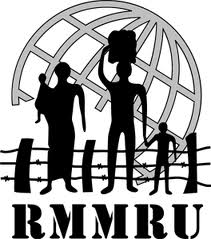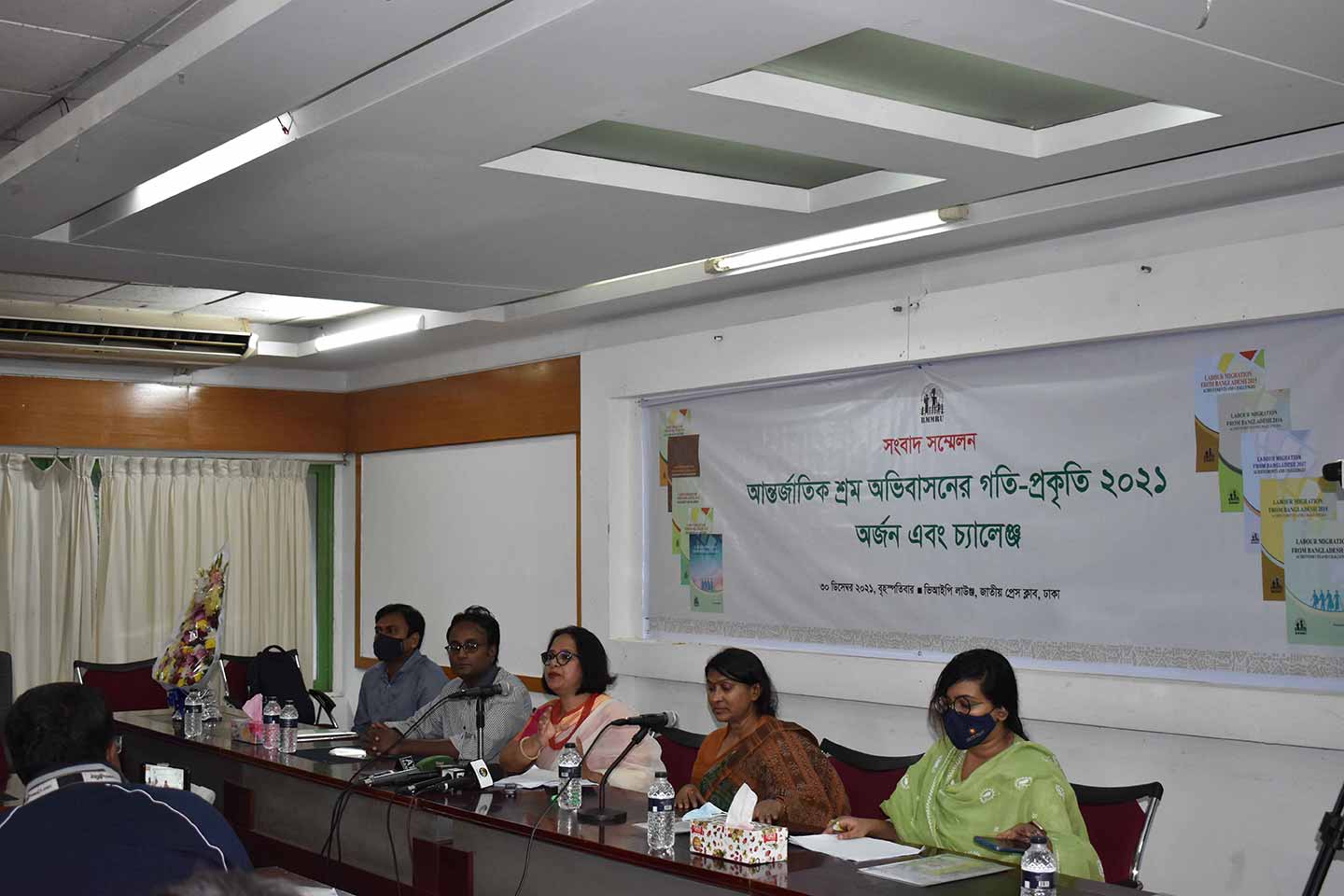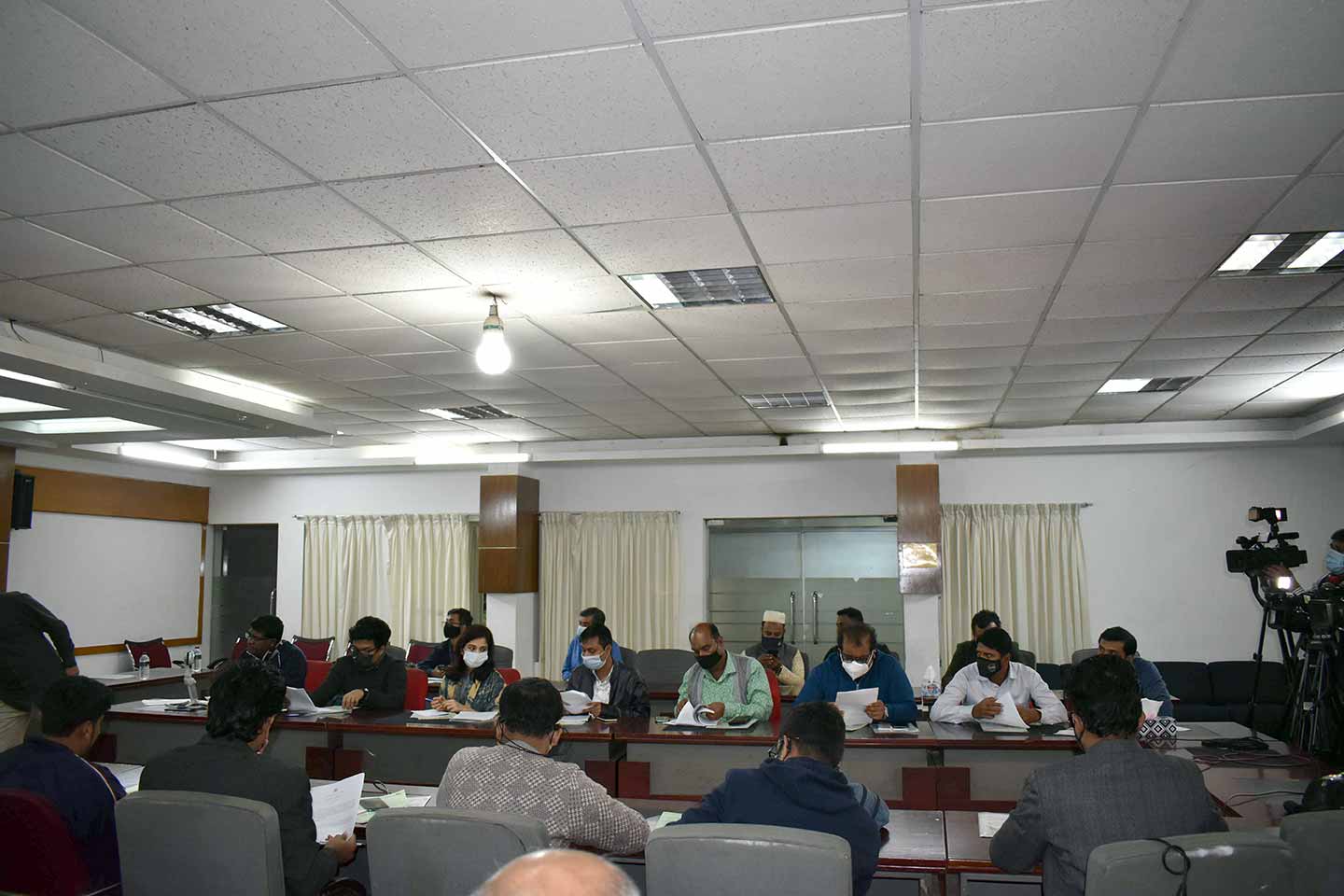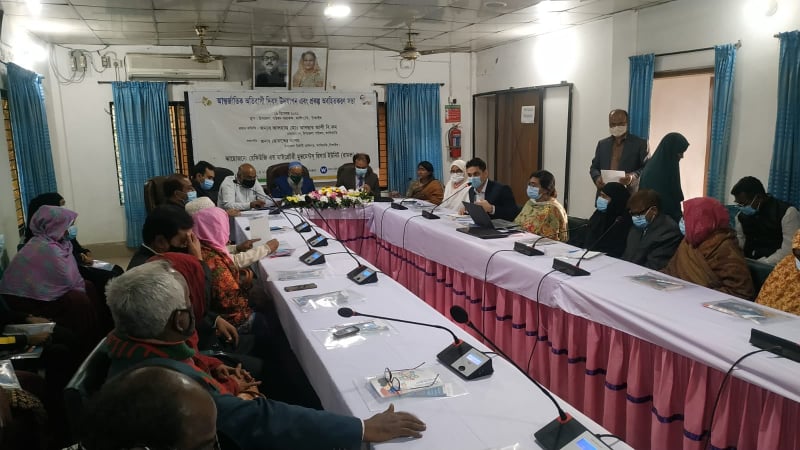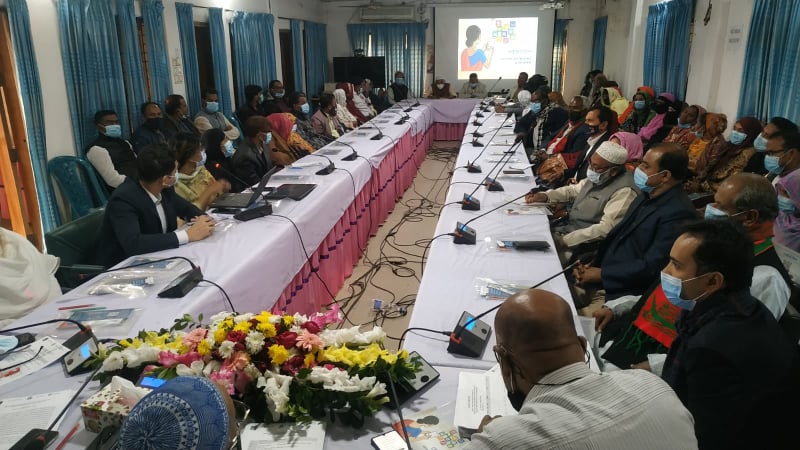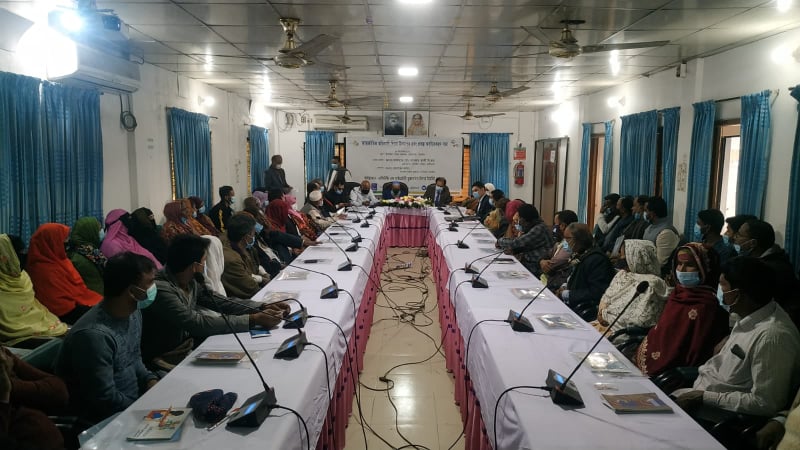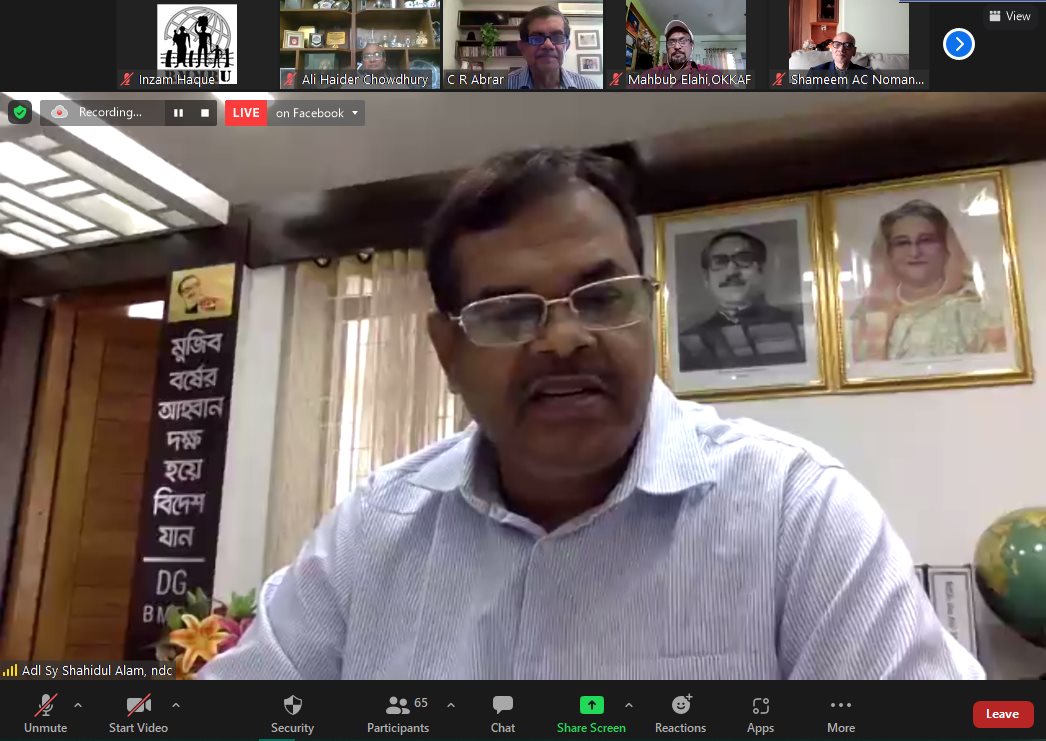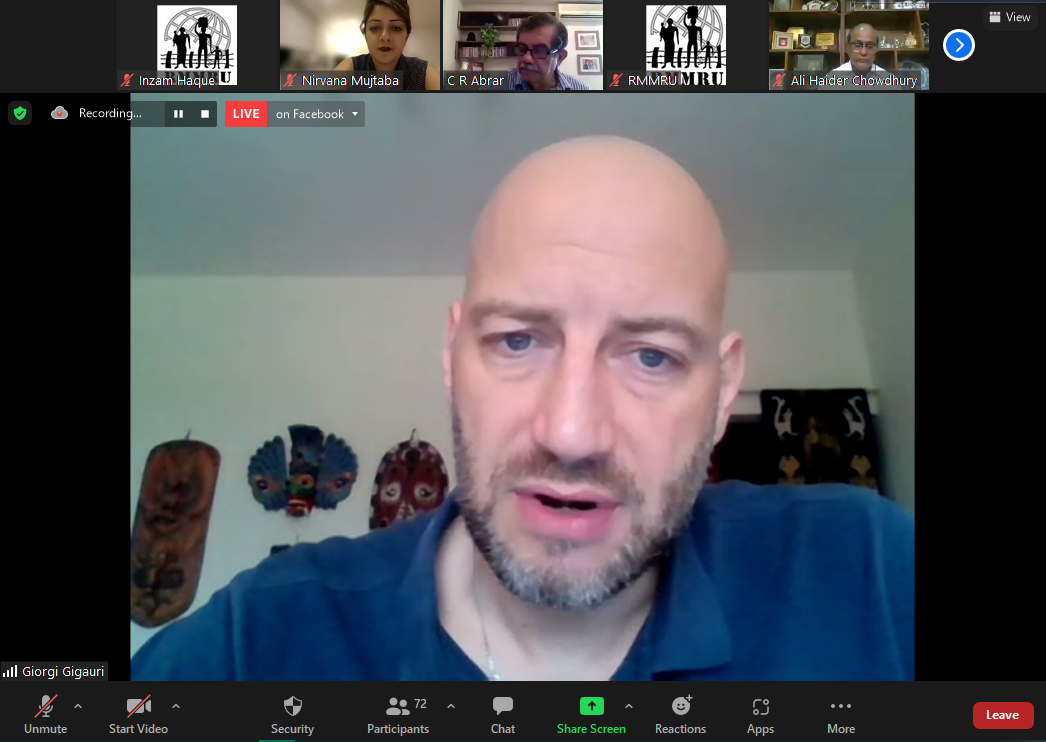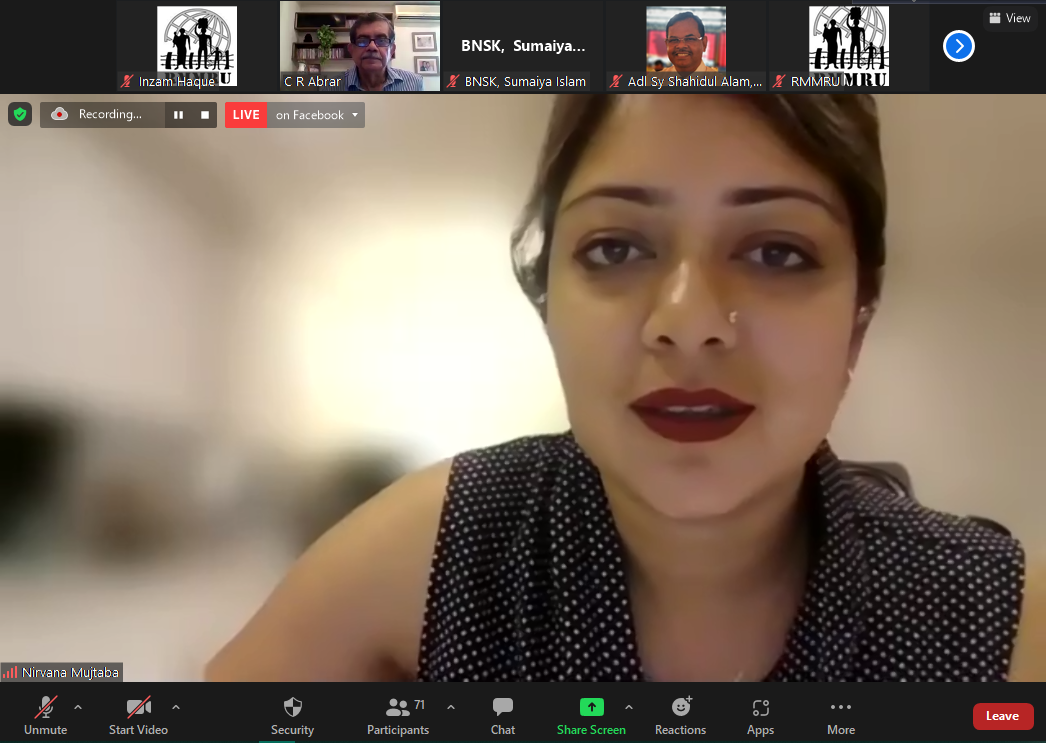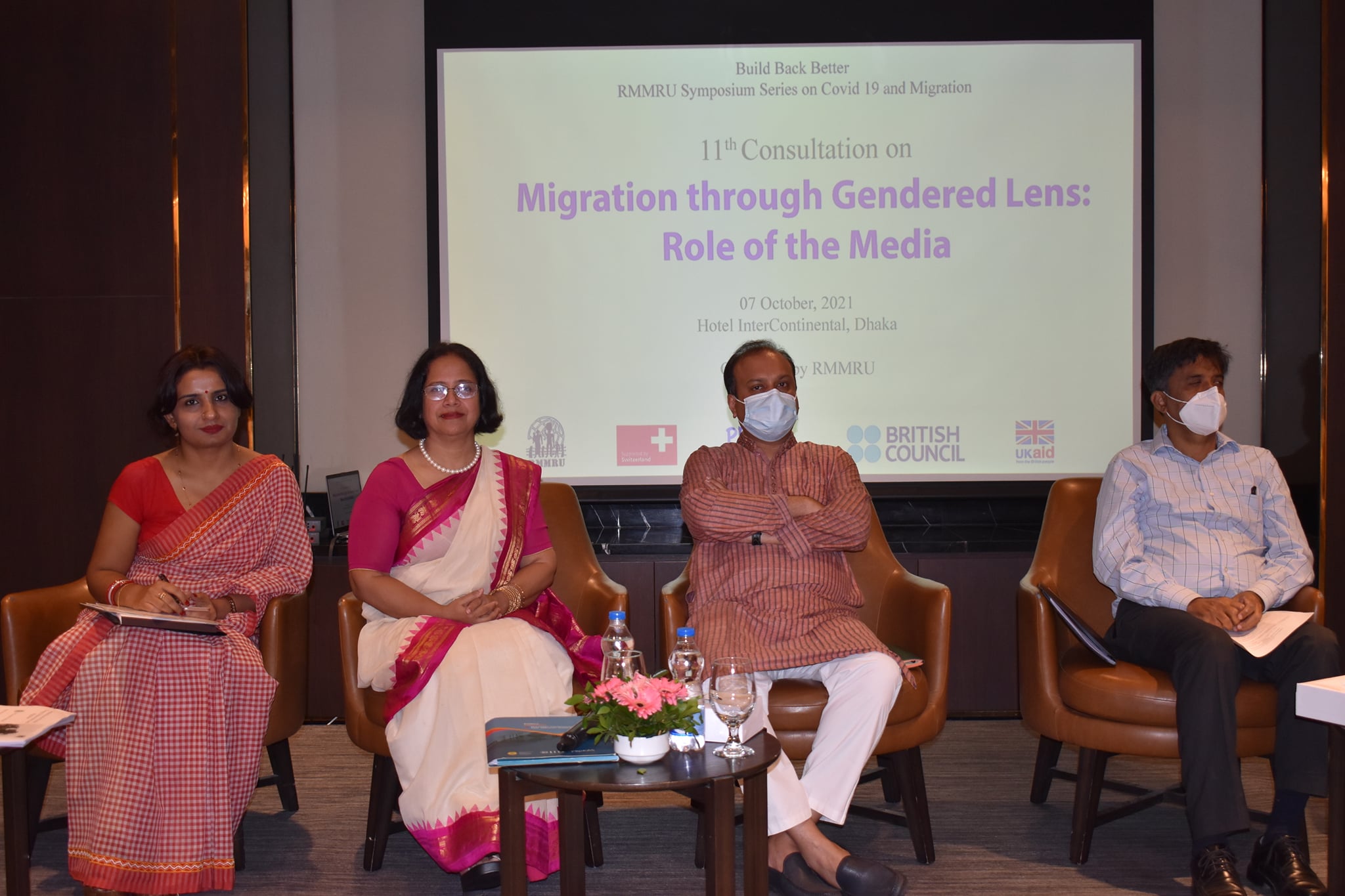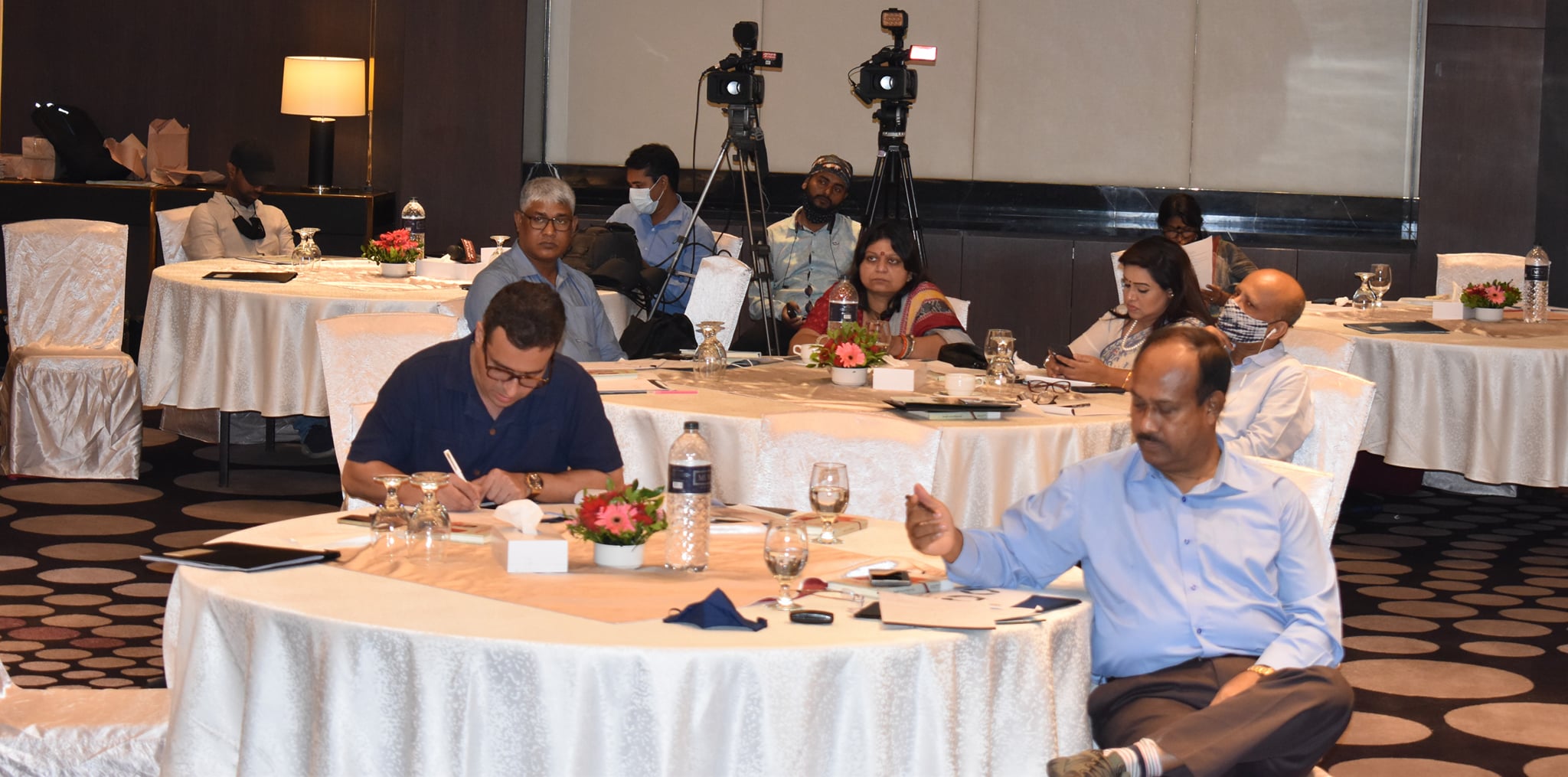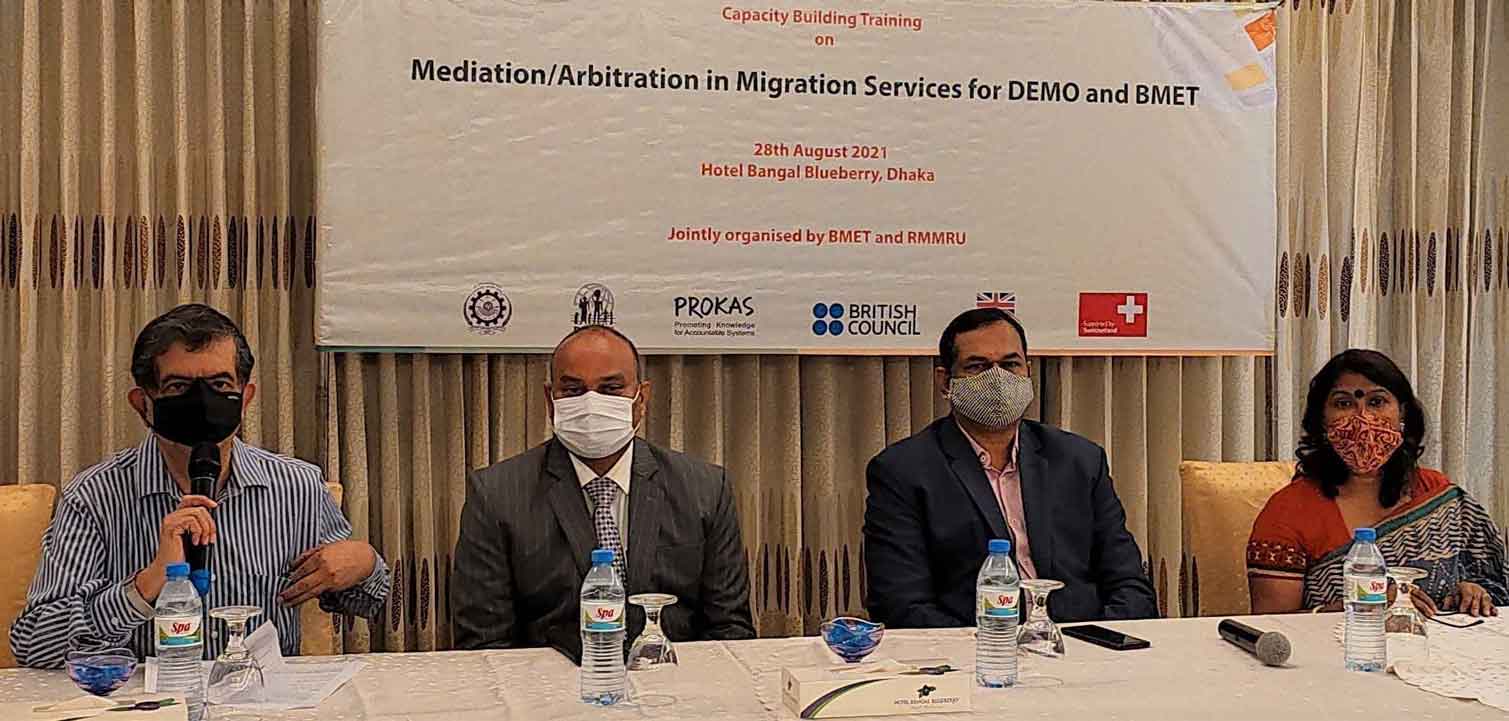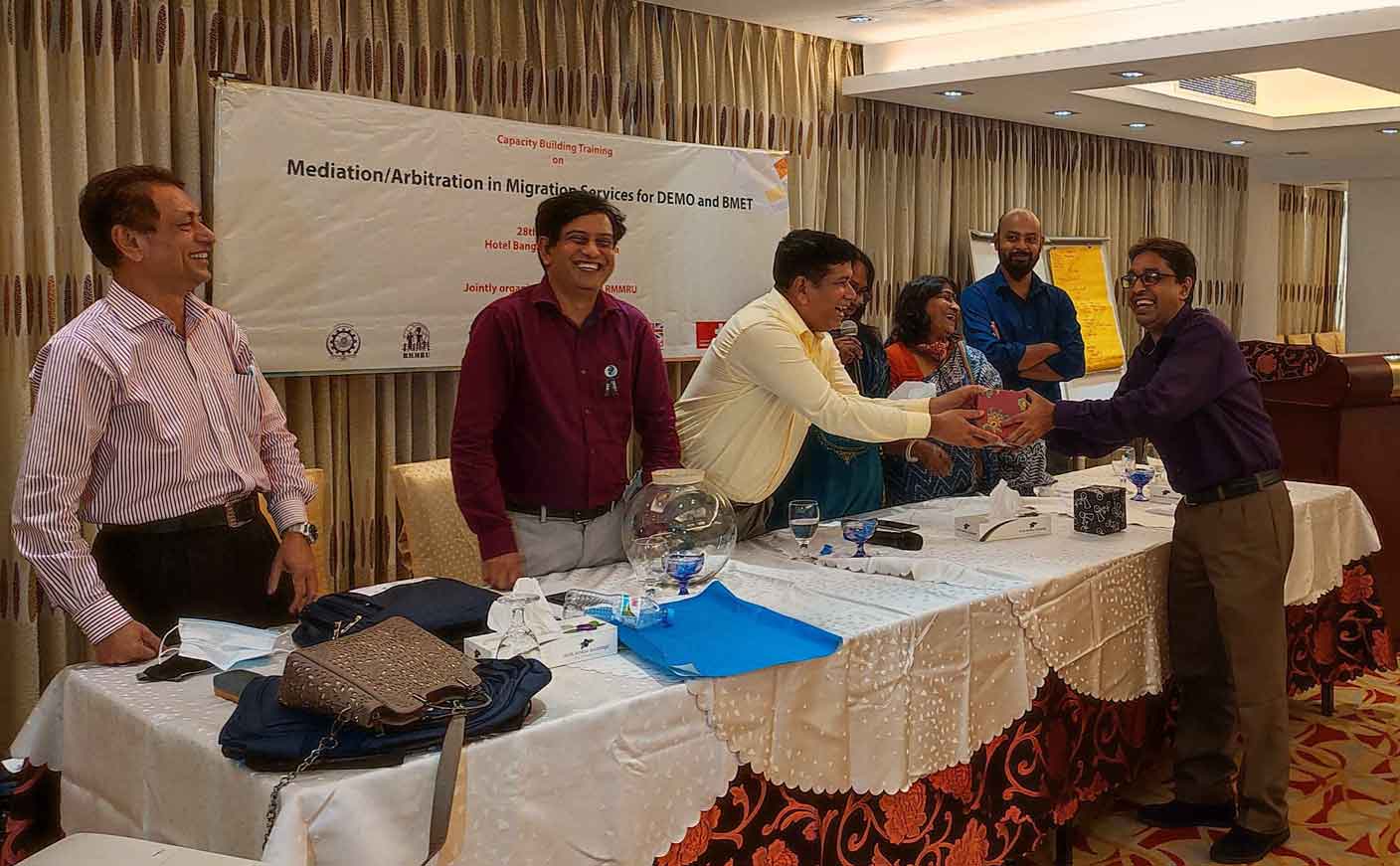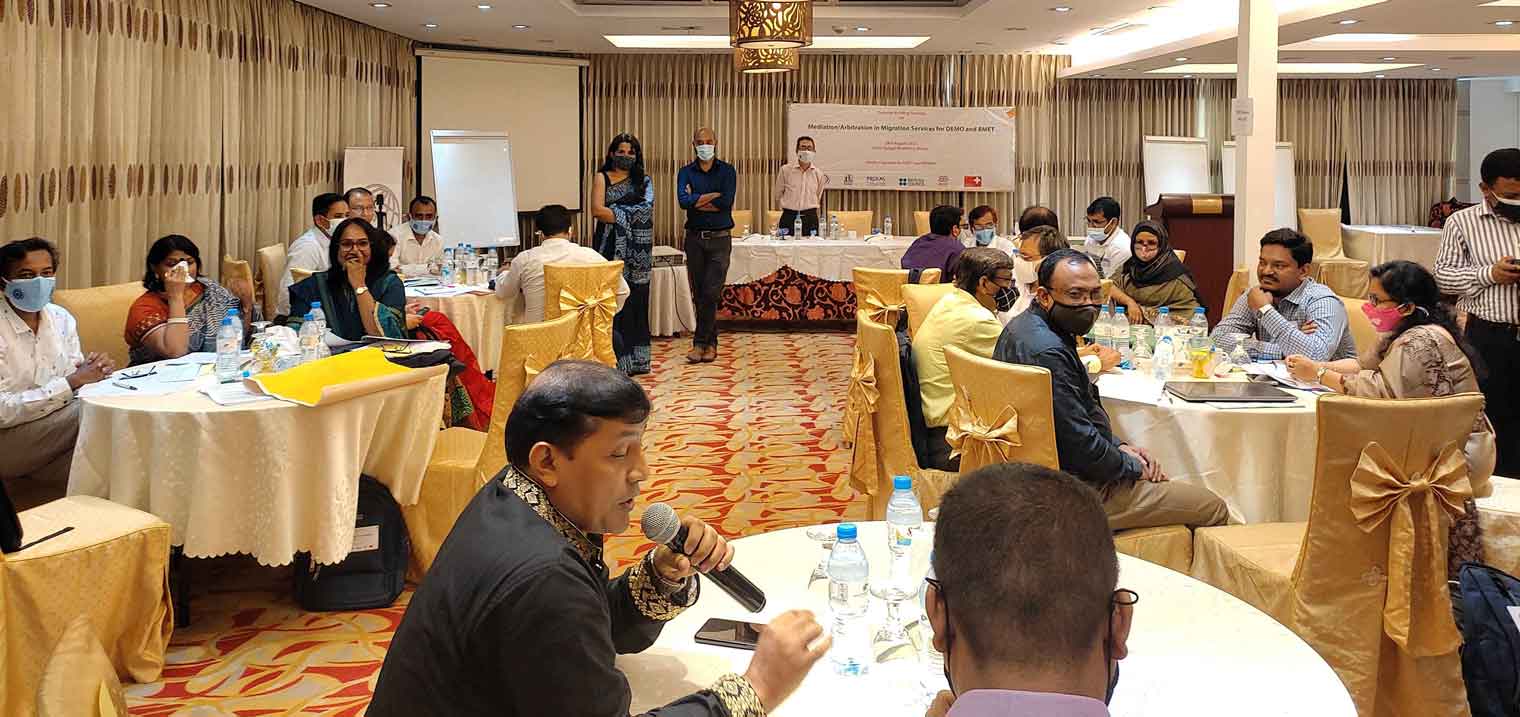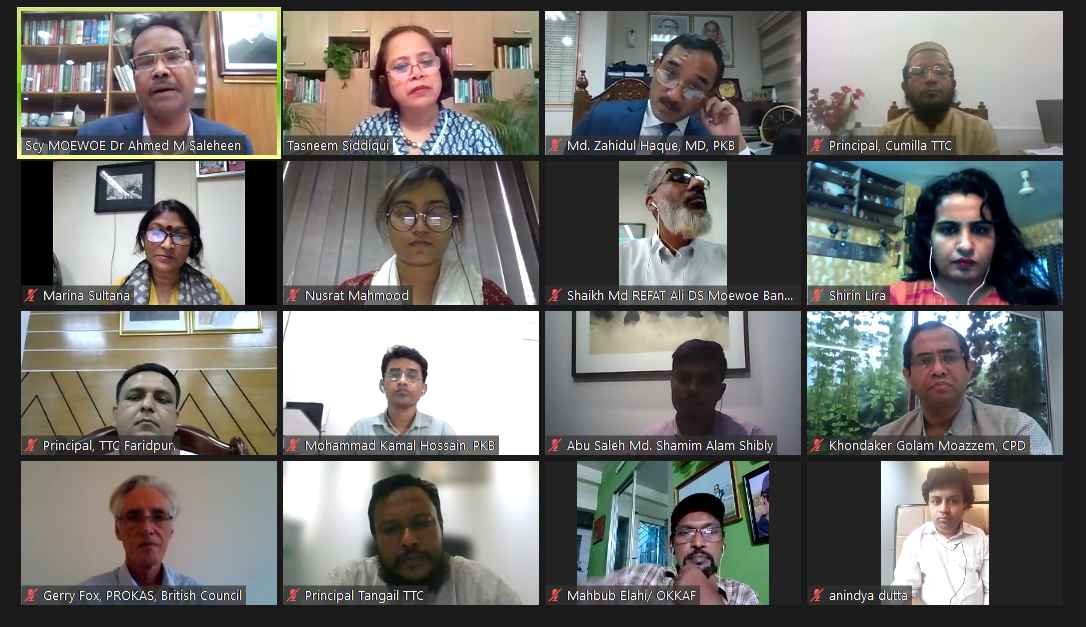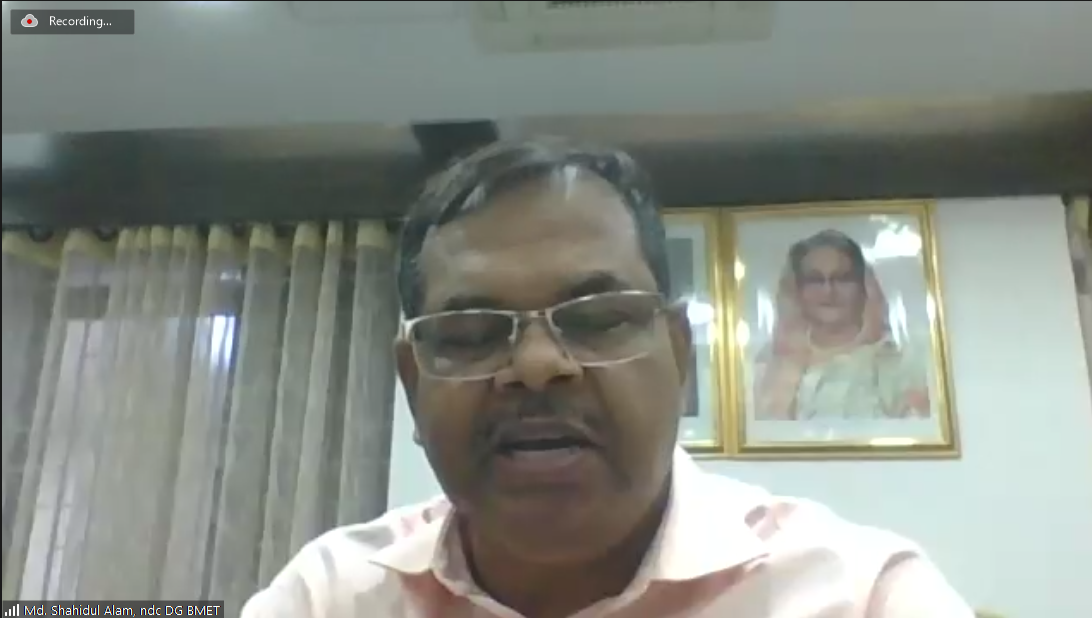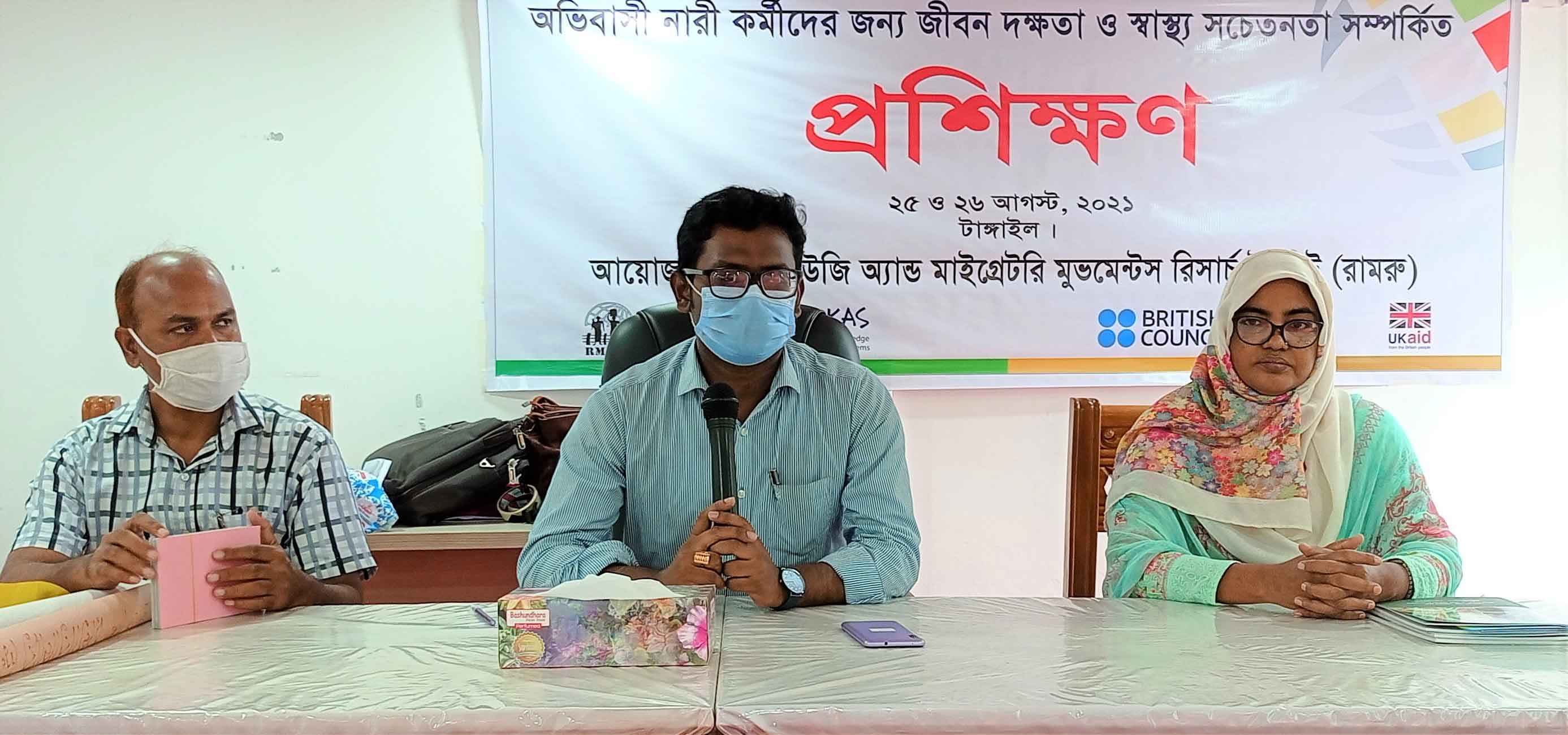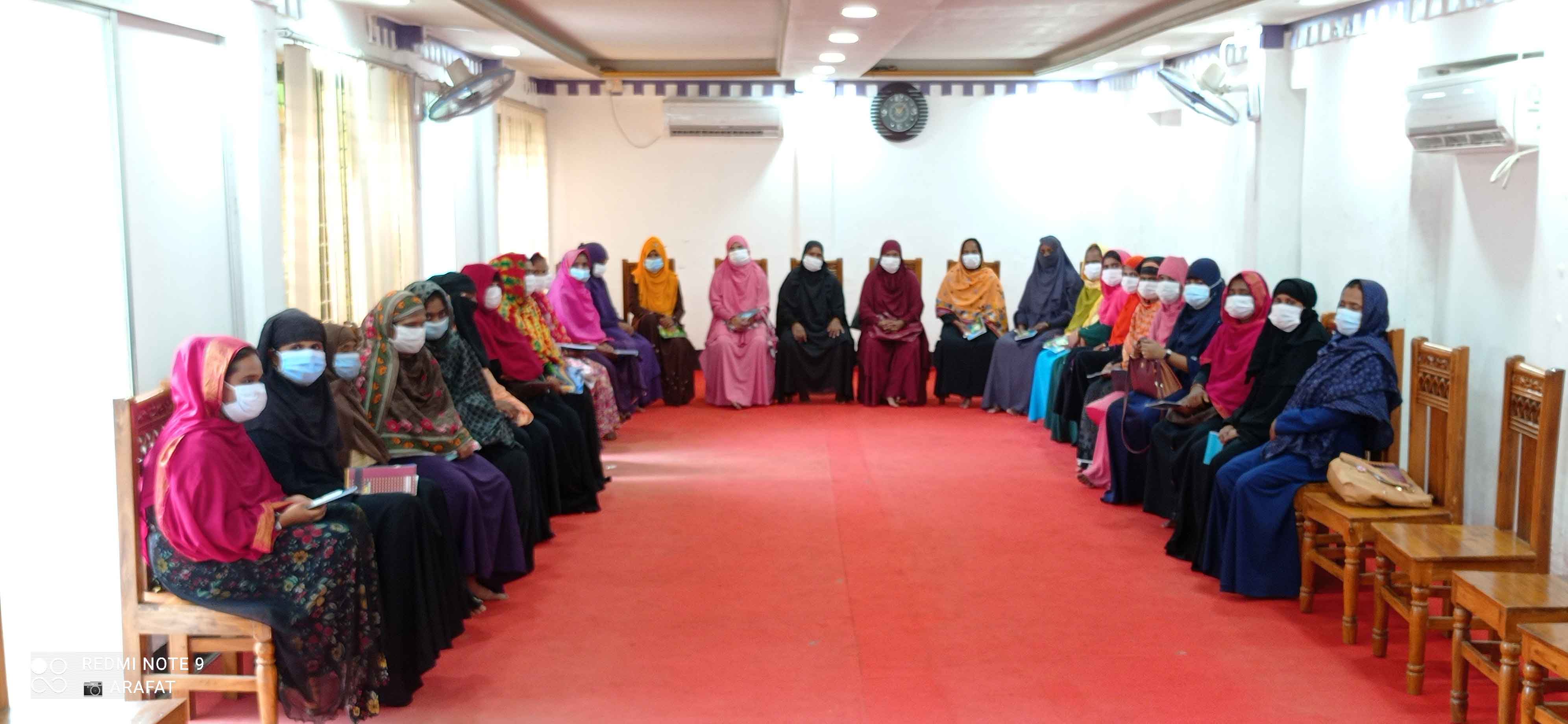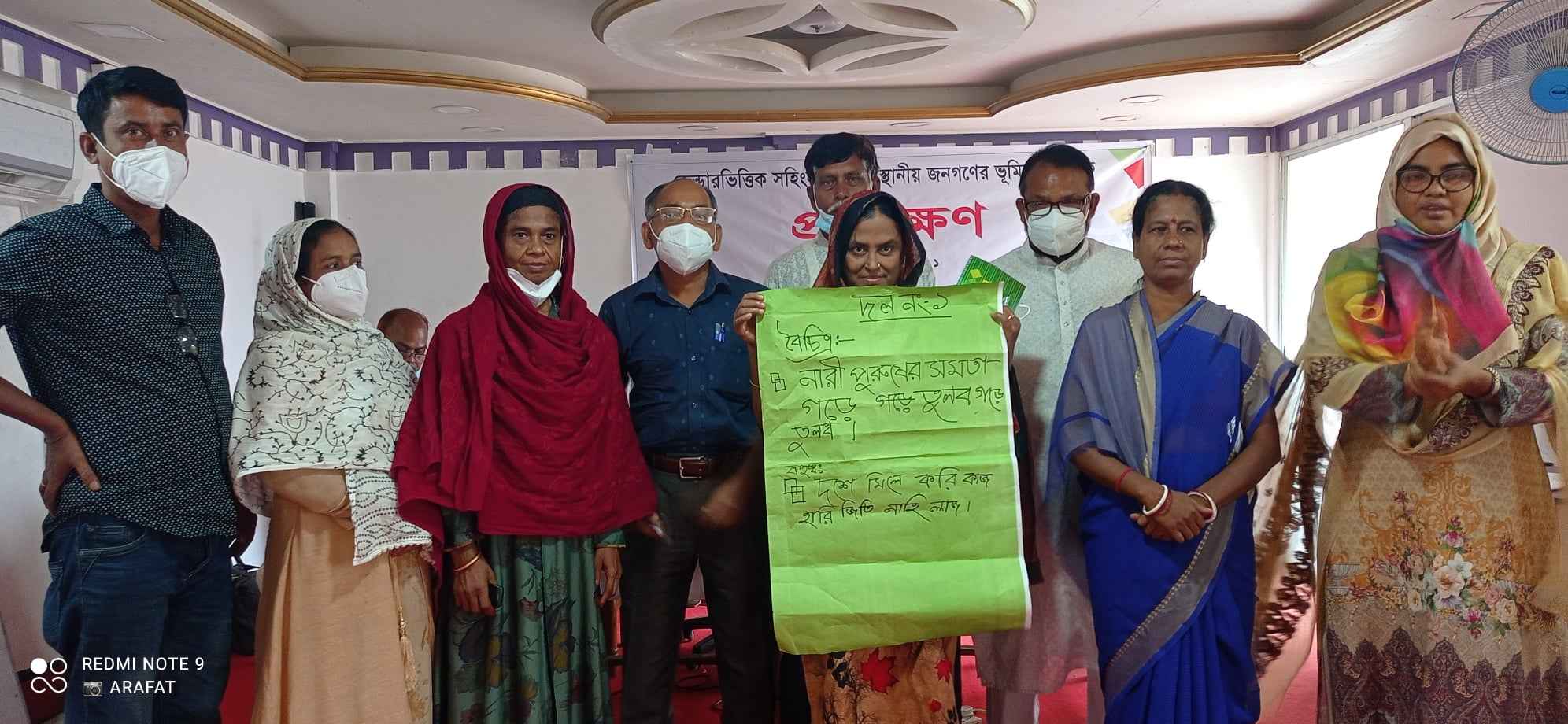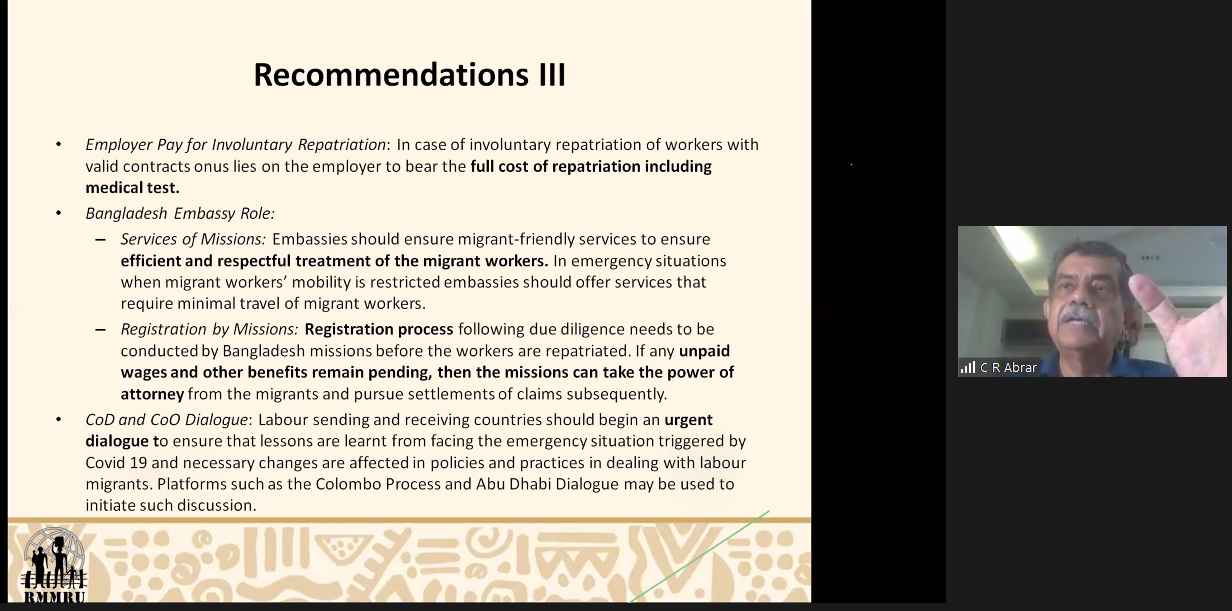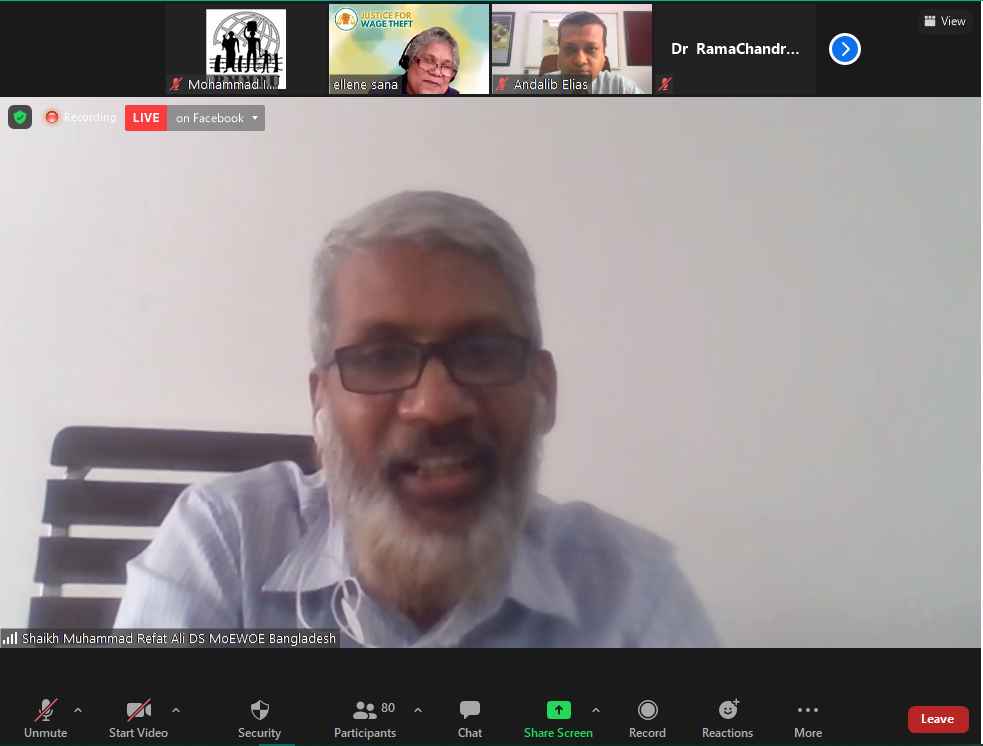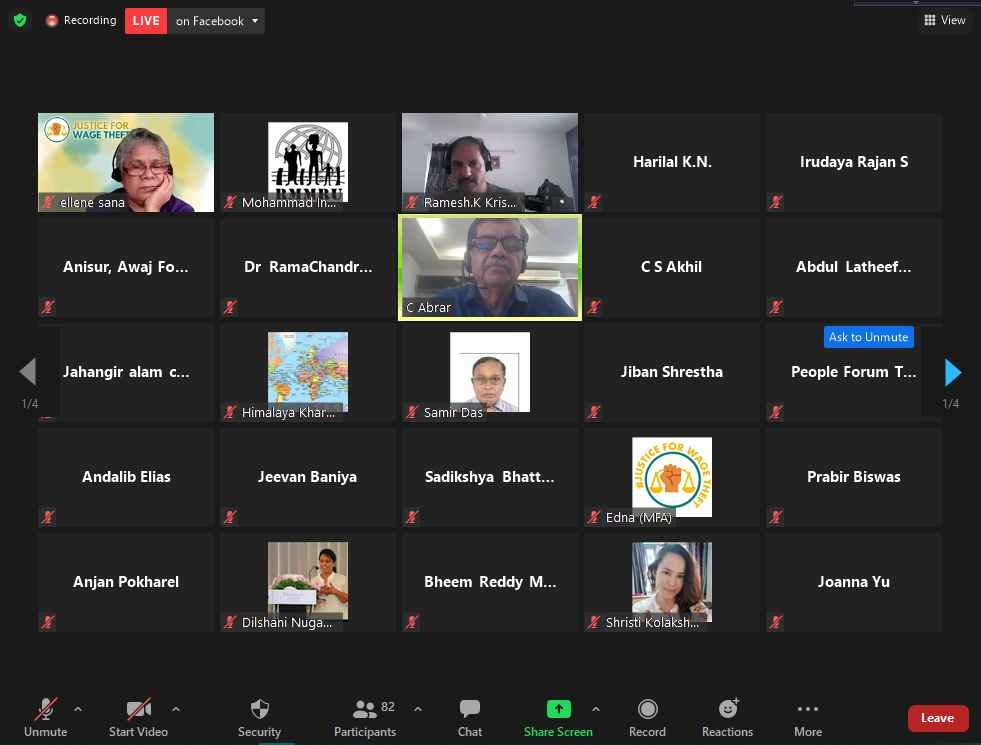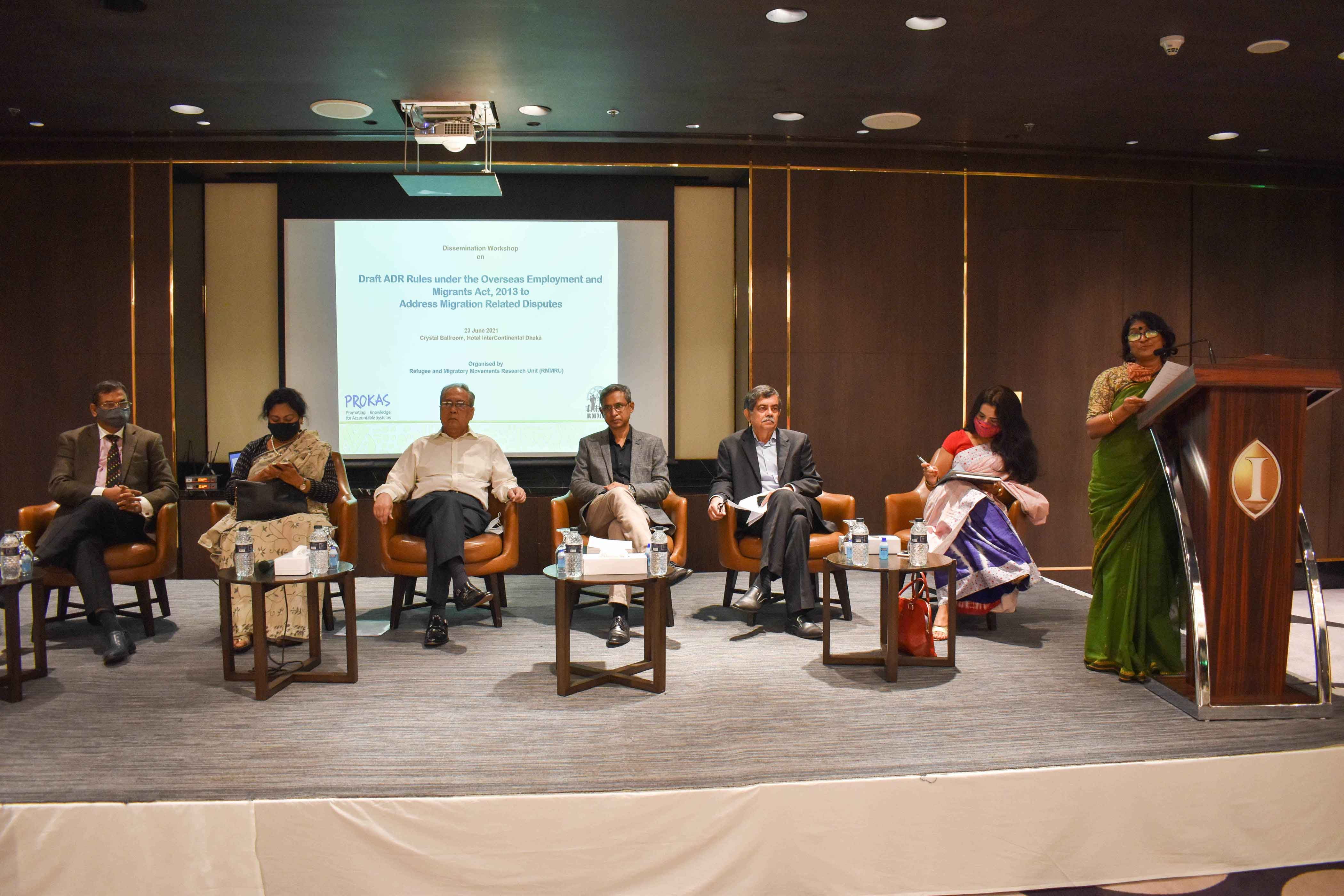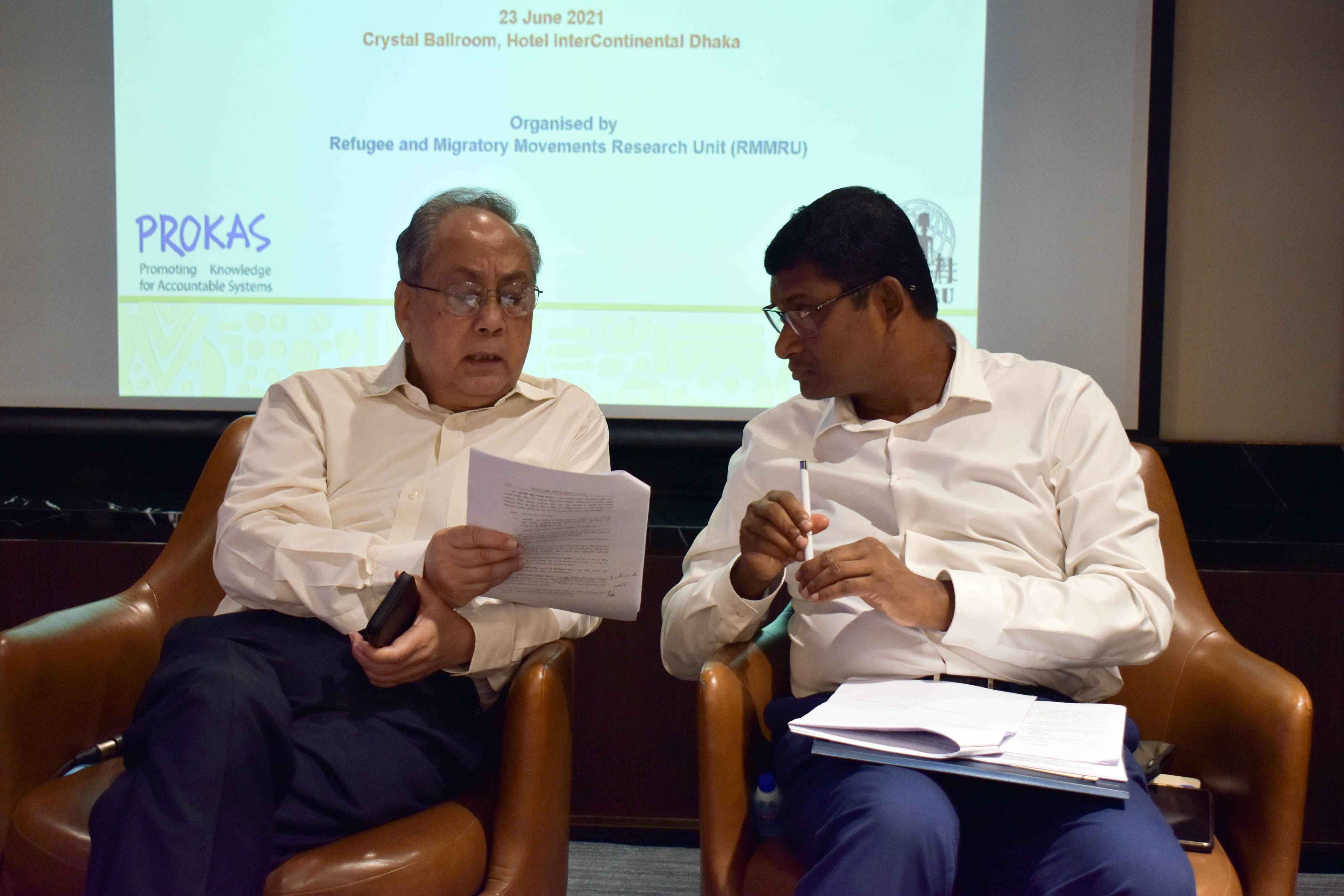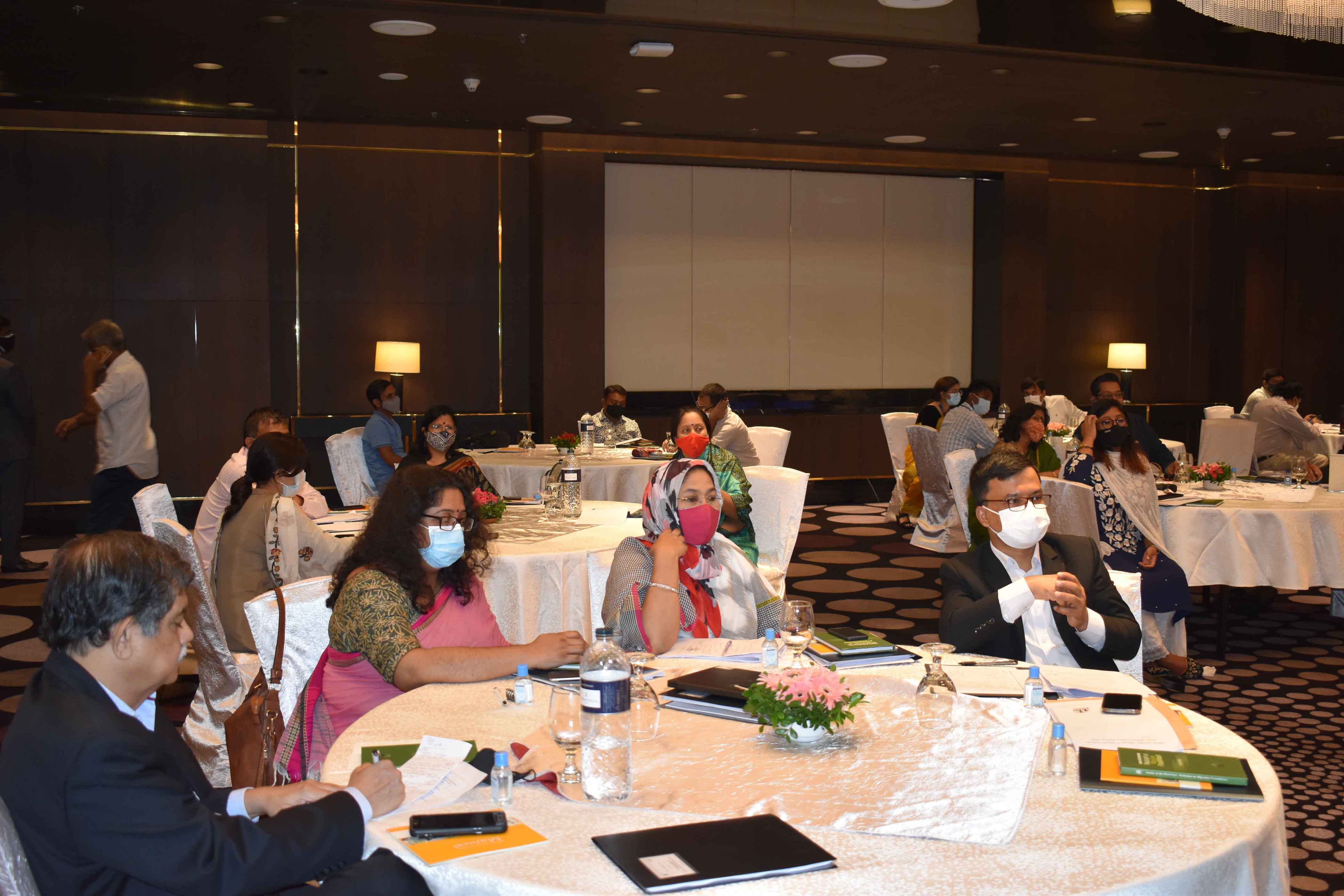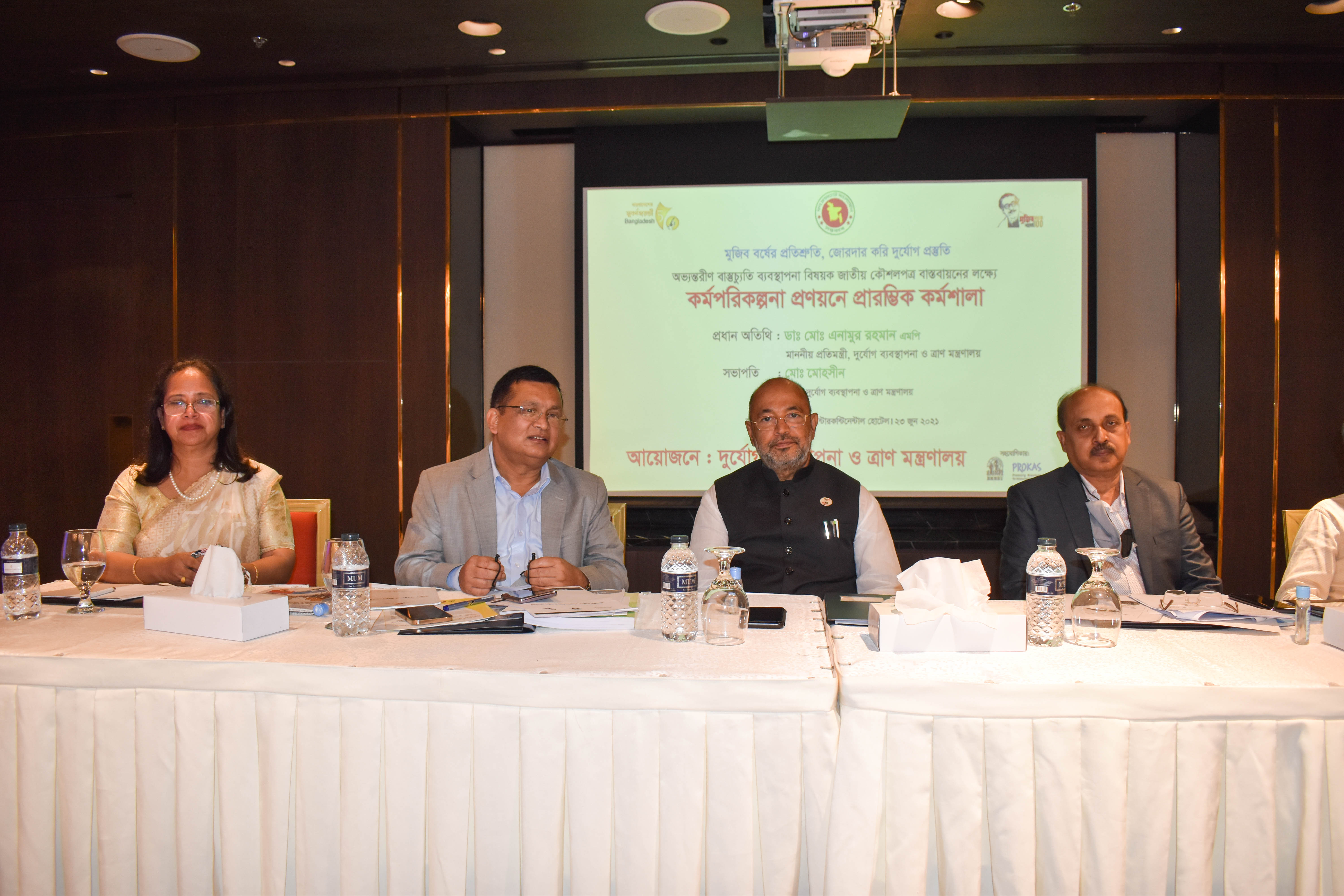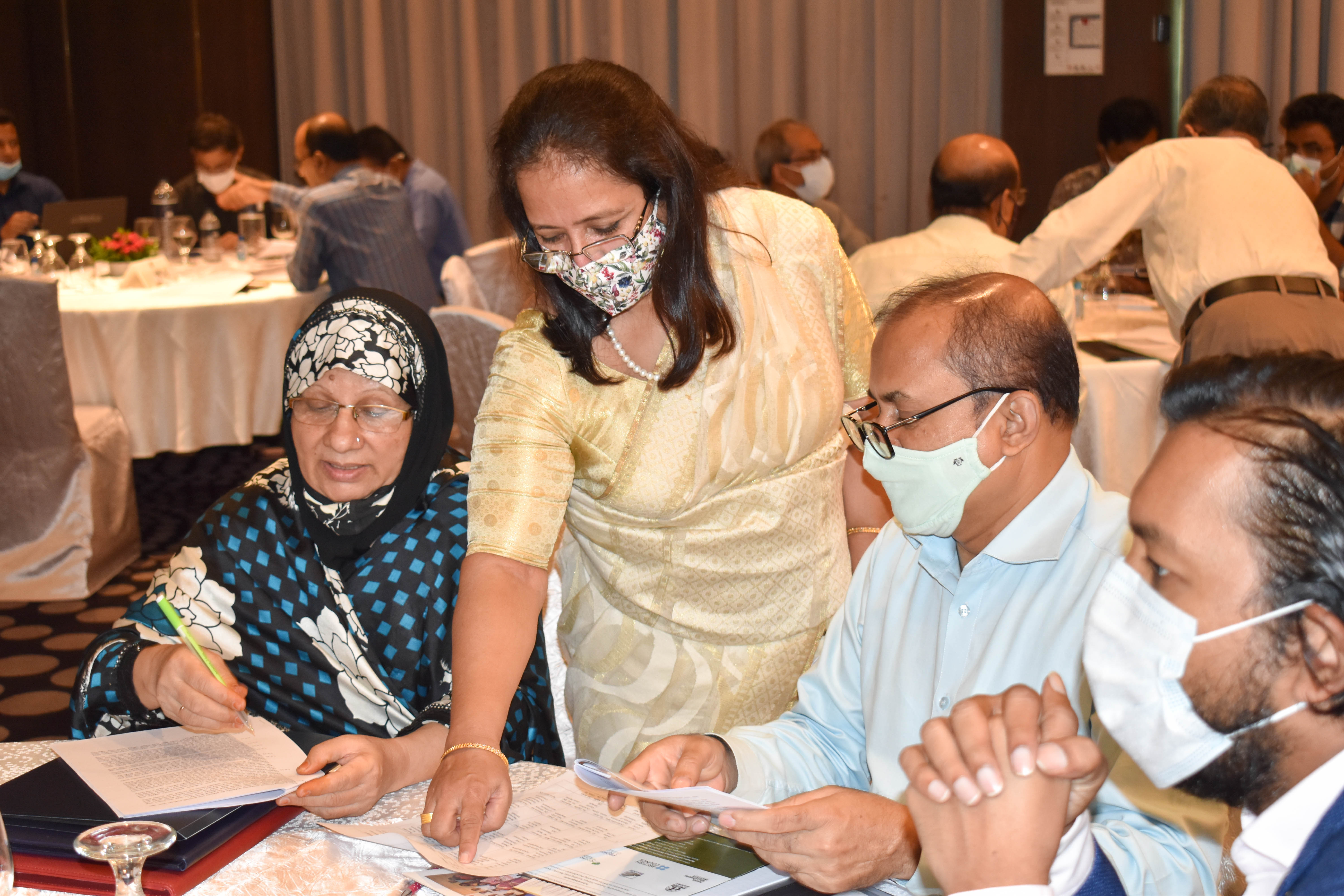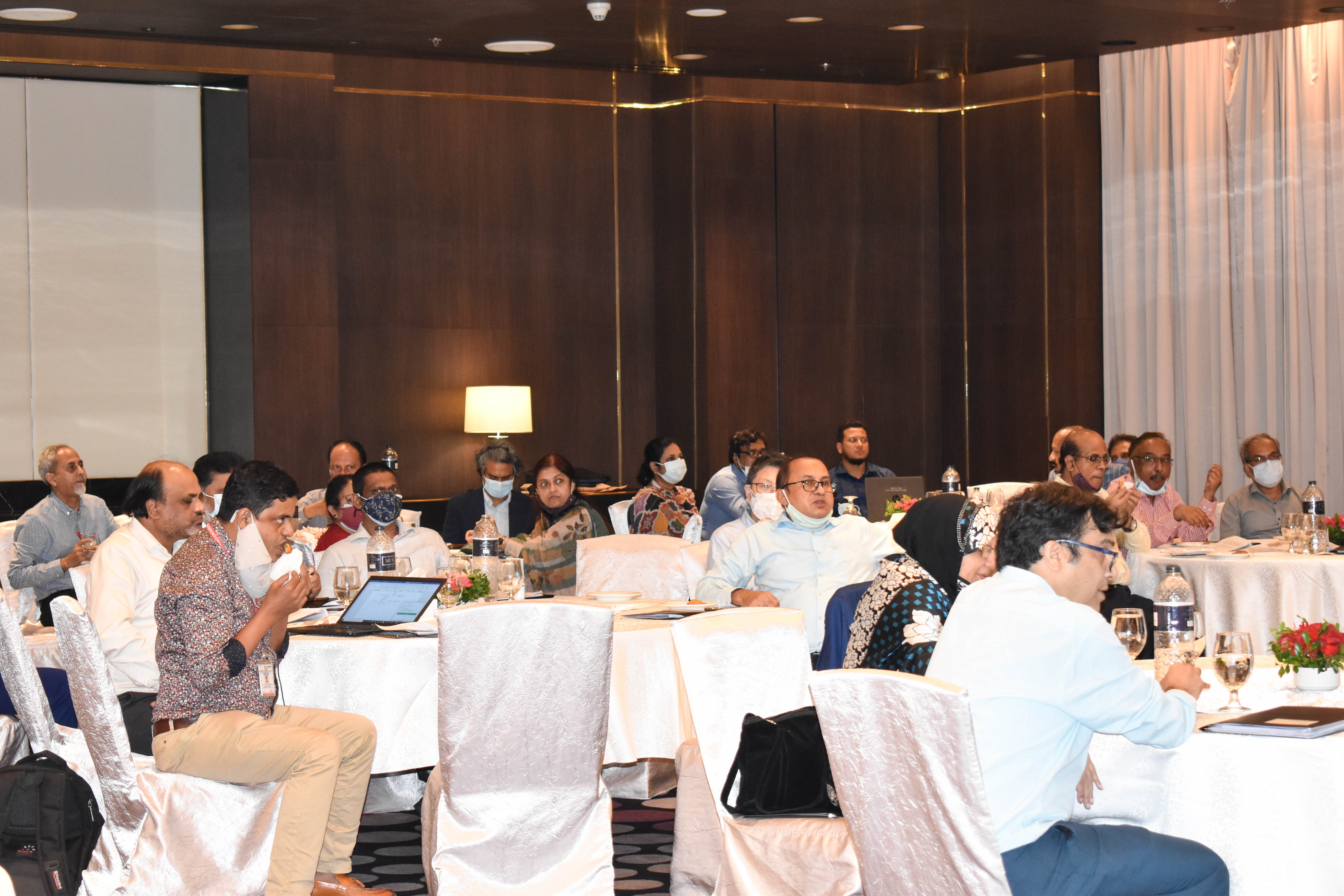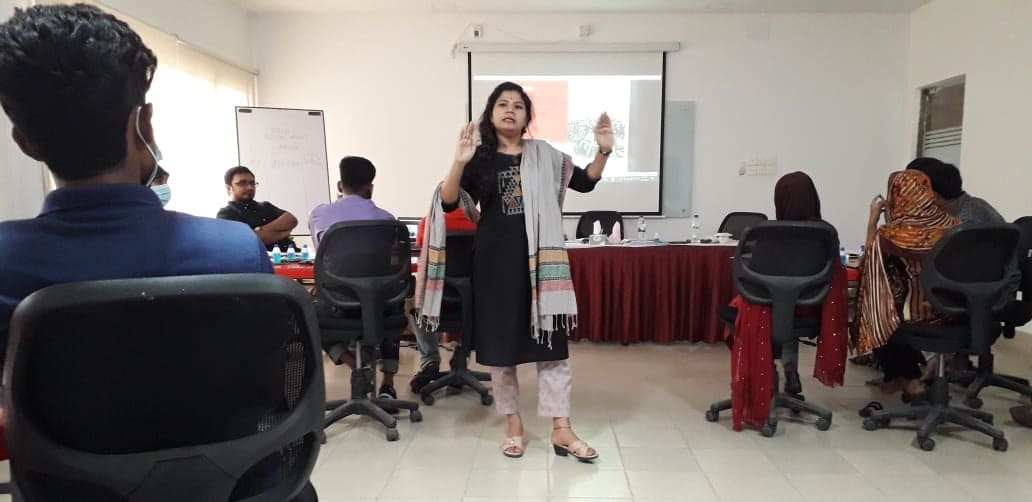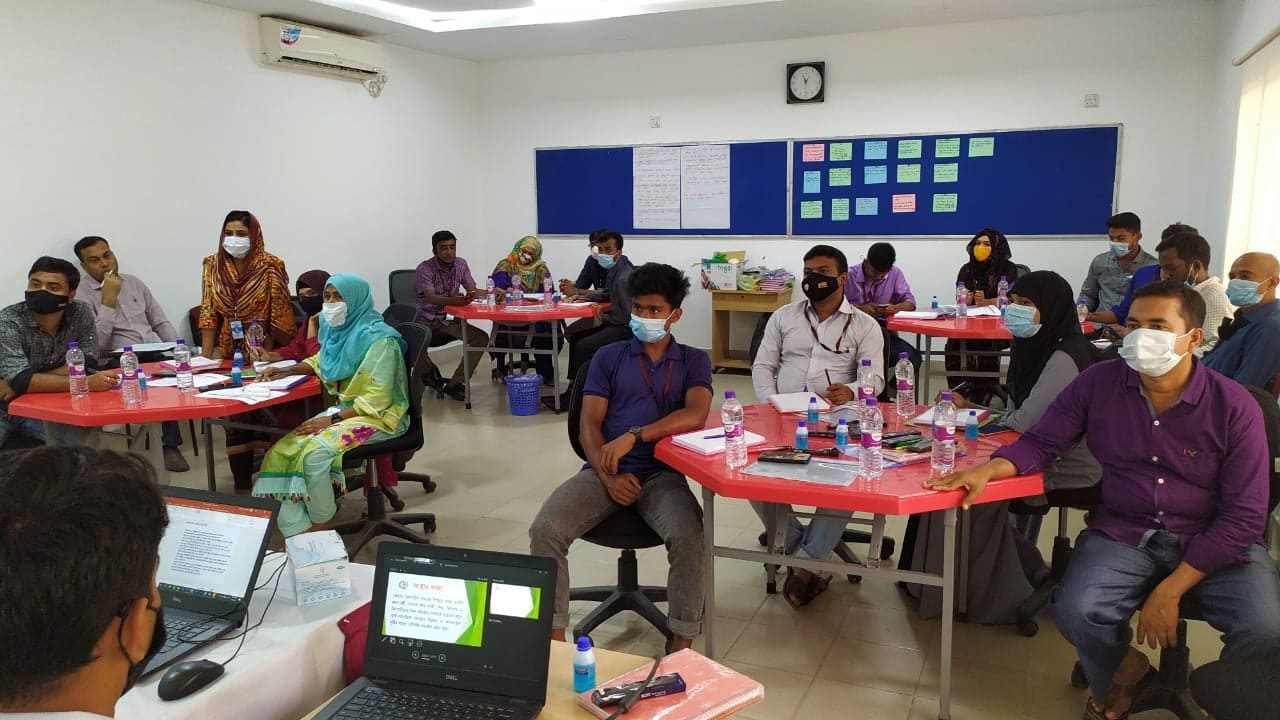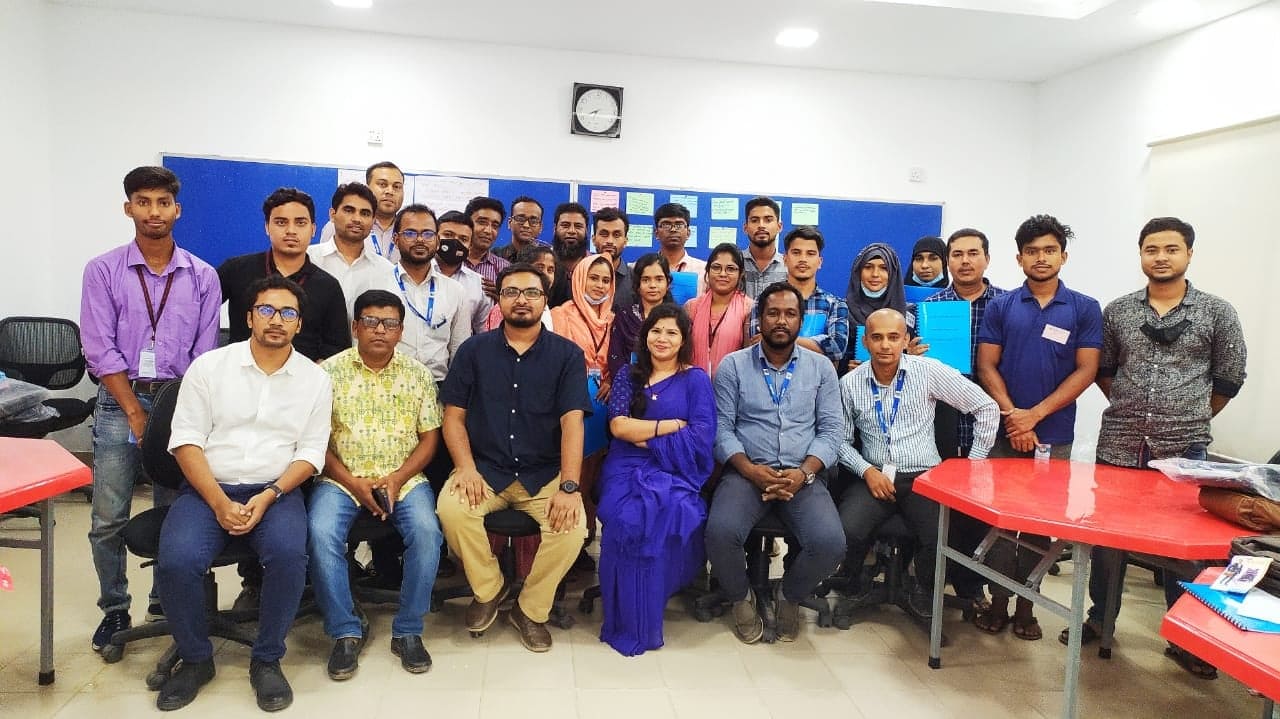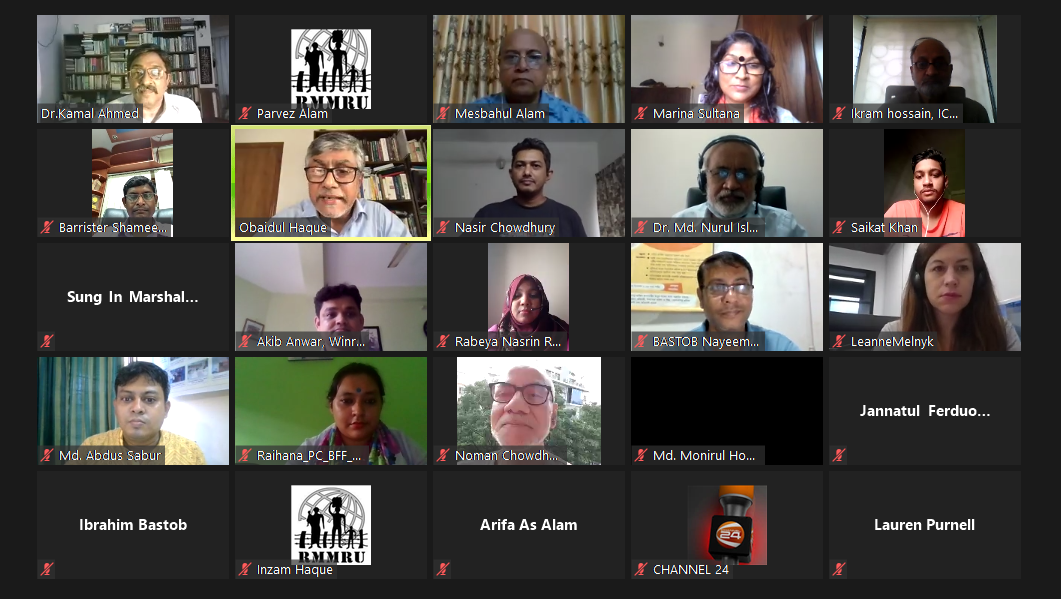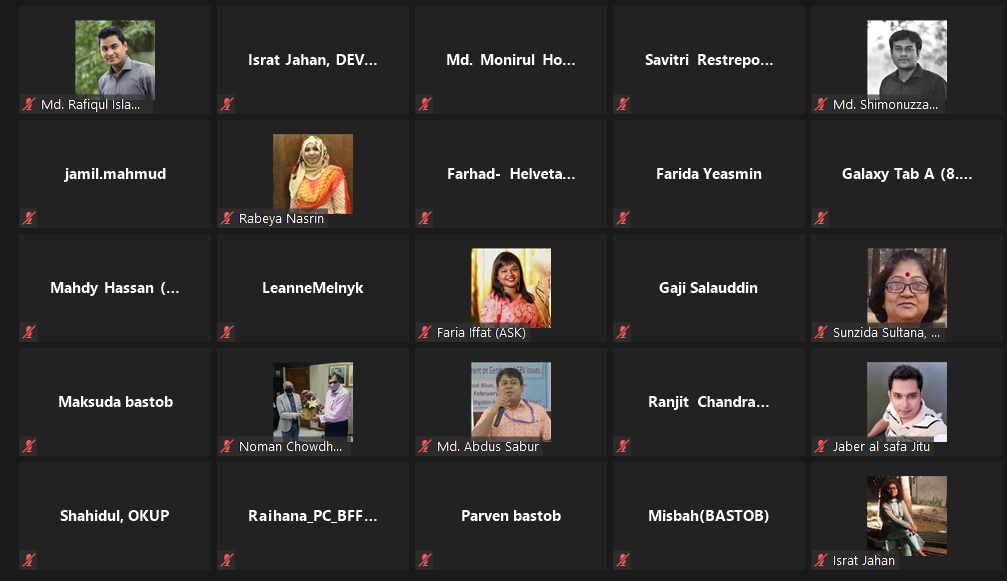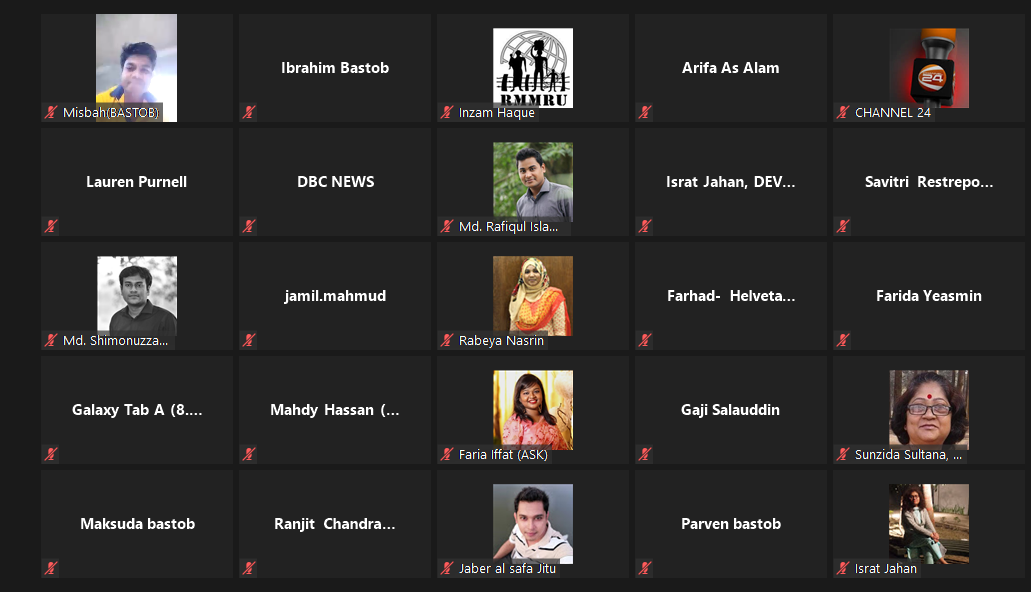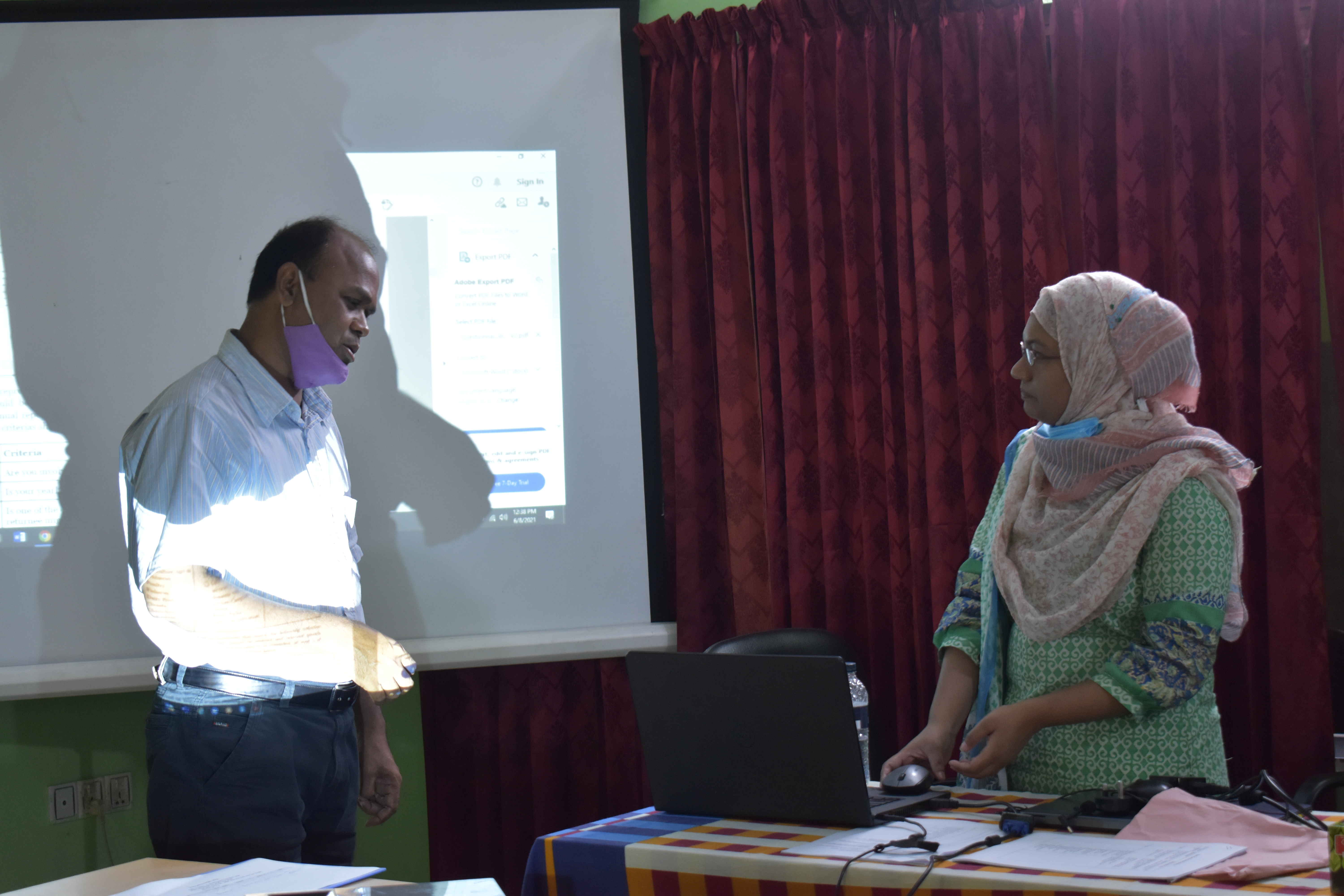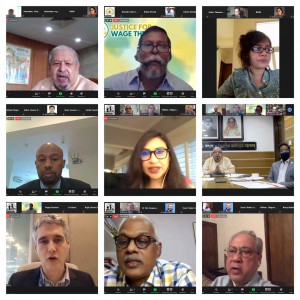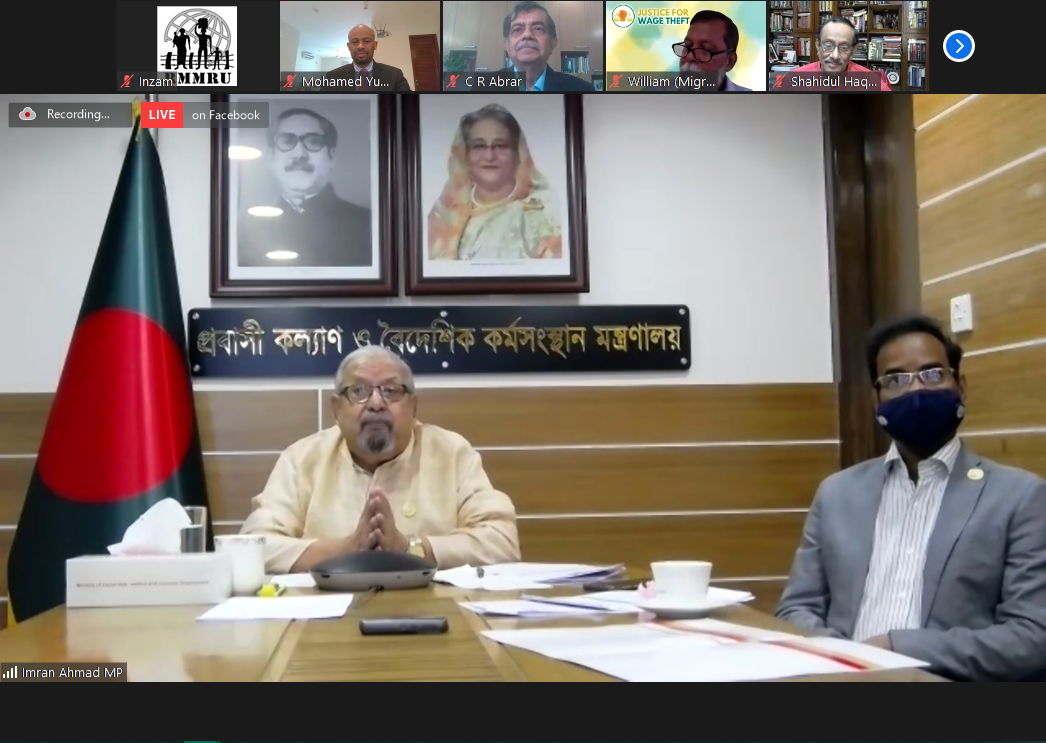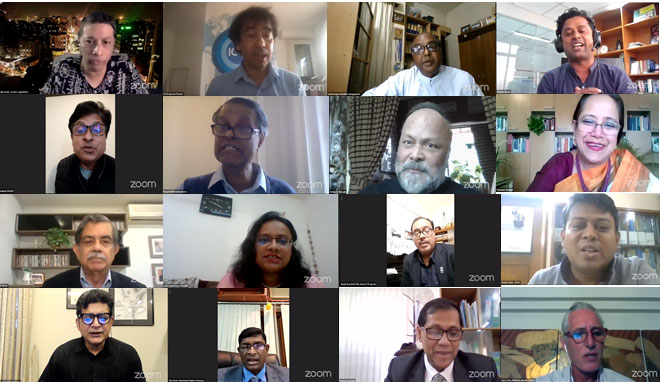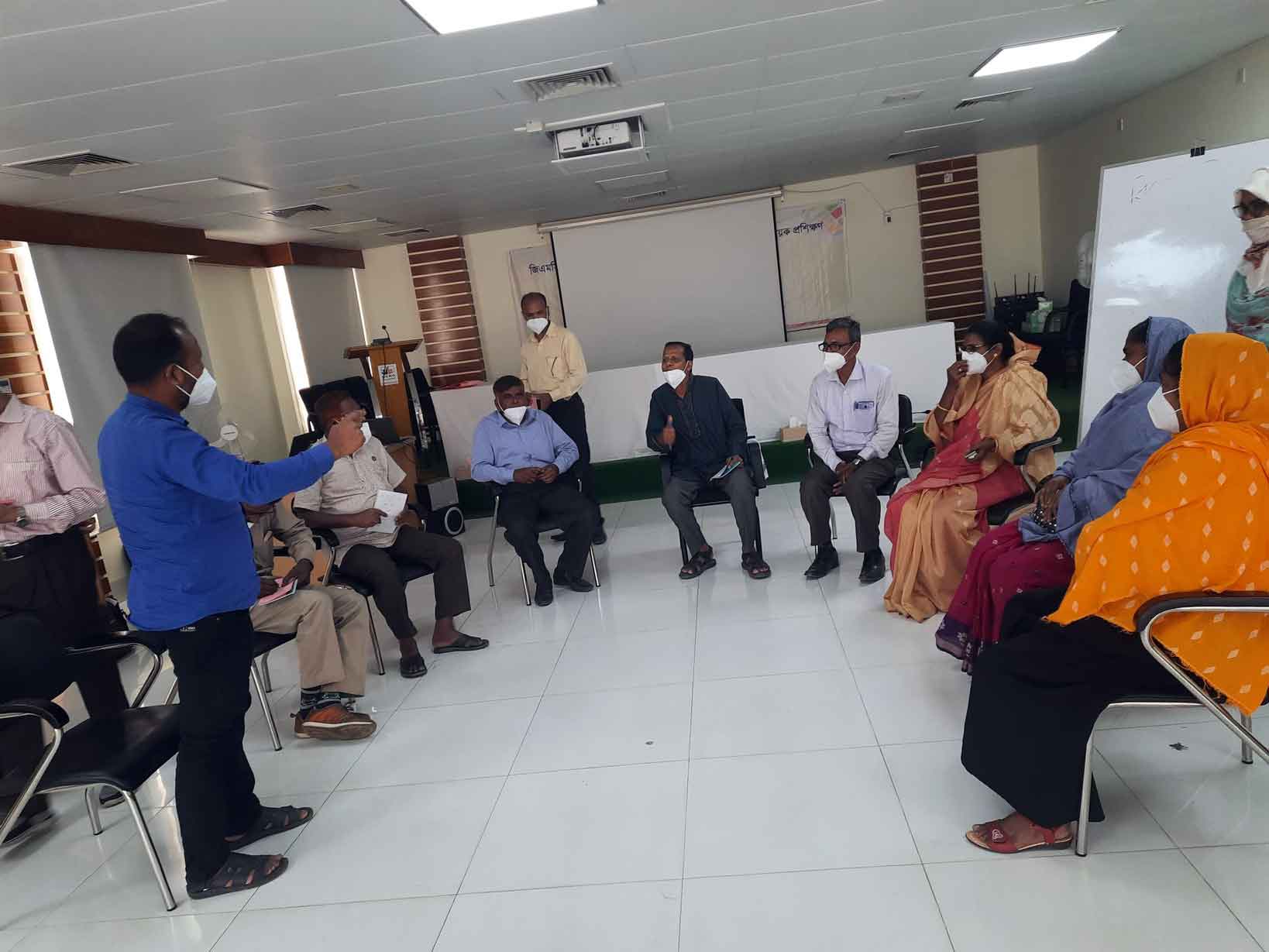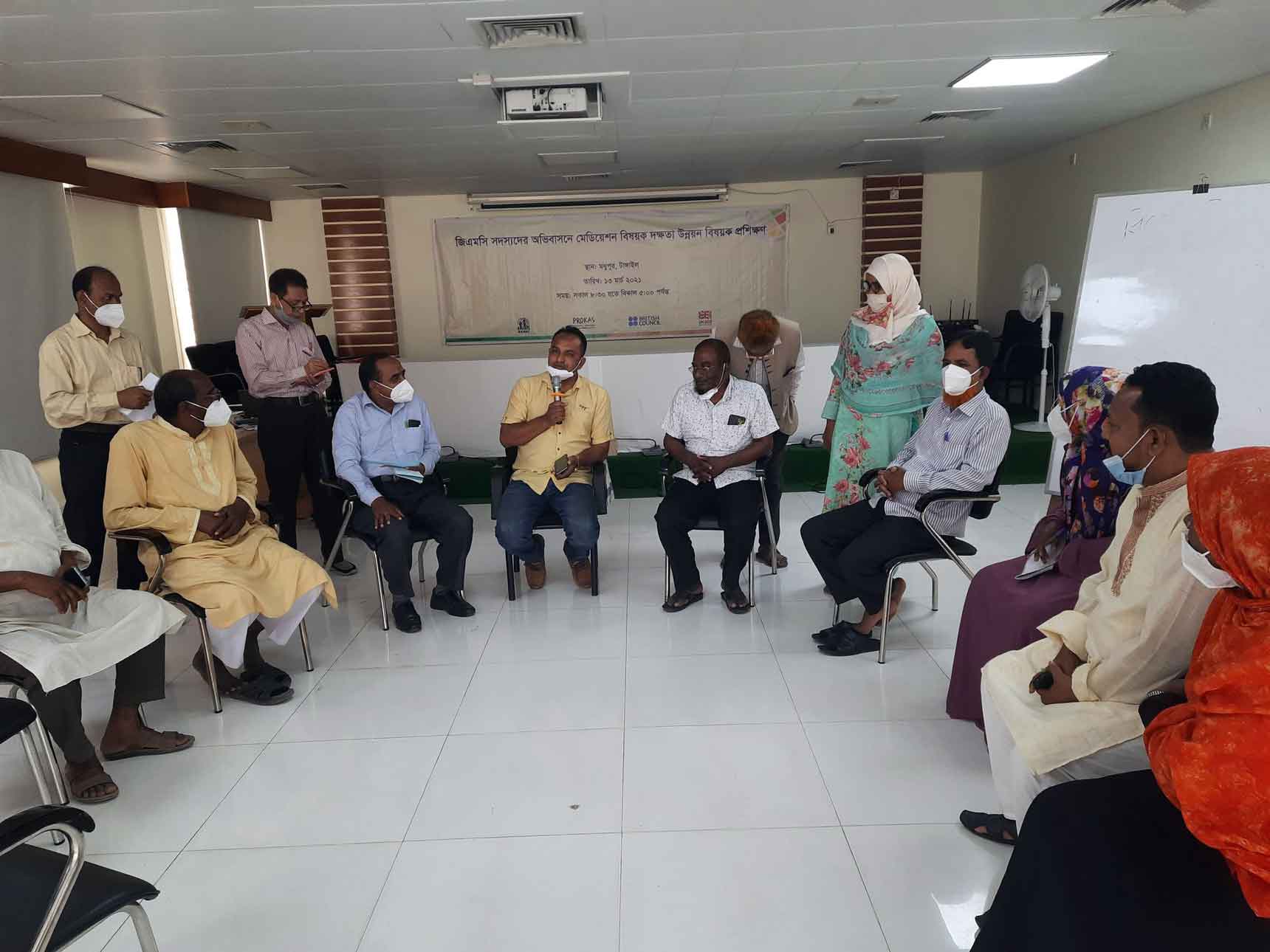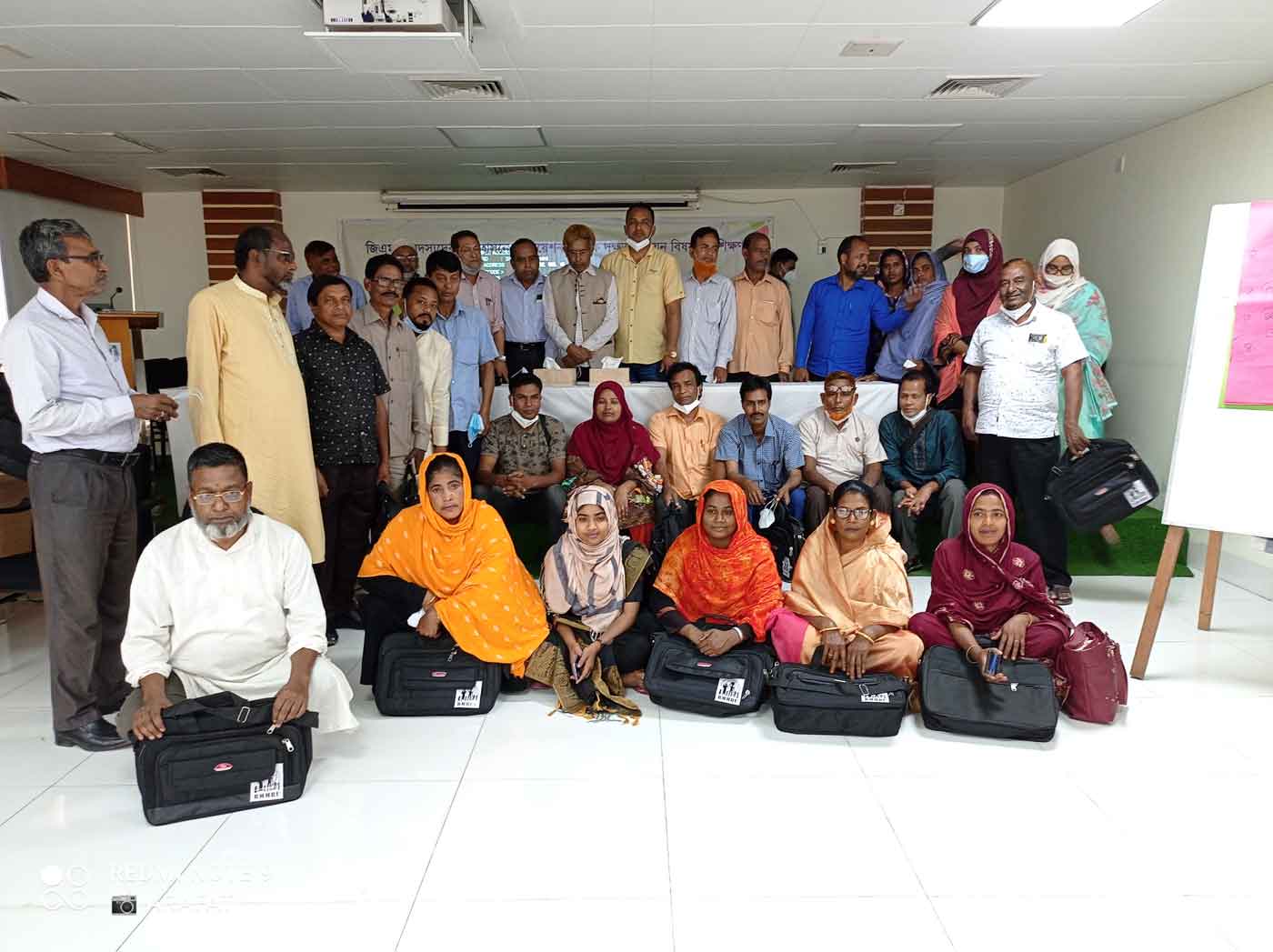Organized by: Refugee and Migratory Movements Research Unit (RMMRU)
Date: Thursday, 30 December 2021 at 3.00 pm
Venue: VIP Lounge, National Press Club, Dhaka
RMMRU organized a press conference to disseminate Annual Migration Trends Report on 30 December 2021 at the VIP Lounge, National Press Club, Dhaka. Dr. Tasneem Siddiqui, Founding Chair, RMMRU and Professor, Department of Political Science, University of Dhaka presented the report named “The Patterns and Trends of Labour Migration from Bangladesh in 2021: Achievements and Challenges”. The report contained seven sections: labour migration from Bangladesh 2021, reflection on important issues, service providing agencies, law and policy changes in Bangladesh, international law and protection of migrants in COVID pandemic, civil society initiative, Rohingya refugees.
Unveiling the report Dr. Siddiqui said that, in 2021 a total of 617,209 Bangladeshi workers migrated to the destination countries. Compared to the previous year (2020), migration has increased by 183.6 percent in 2021. In 2021, a total of 80,143 women workers have gone abroad for work. Compared to the previous year (2020), the number of women migrants has increased 3.7 times in 2021. A total of US$ 22 billion was received as remittances in 2021. This represents a 1.4 percent increase in flows this year.Dr. Tasneem Siddiqui also mentioned the important events in the migration sector of 2021 and discussed about the newly signed MoU between the government of Bangladesh and Malaysia for the recruitment of migrant workers from Bangladesh. Besides, she mentioned, the issue of migration raised at the COP-26 climate conference in Glasgow, Scotland, COVID vaccination facilities and challenges for migrants, amending initiative of the Overseas Employment and Migrants Act, 2013 and civil society organisations’ recommendations etc.
Nearly 54 journalists from different electronic and print media were present at the press conference and 18 electronic and print media covered the news. Please find the links to the coverage of the press conference below.
News Coverage
The Daily Prothom alo: রামরুর প্রতিবেদন: প্রবাসে দক্ষ কর্মী পাঠানোর সুযোগ নিতে পারেনি দেশ
The Daily Star: Migration bounces back
The Daily Bangla Tribune: বাংলাদেশে অভিবাসন ব্যয় বেড়েছে ২০২১ সালে: রামরু
The Daily Bangla Tribune: বাংলাদেশে অভিবাসন ব্যয় বেড়েছে ২০২১ সালে: রামরু
The Daily Amader Shomoy: ২০২১ সালে অভিবাসন বেড়েছে দ্বিগুণ
The Daily Amader Shomoy: ২০২১ সালে অভিবাসন বেড়েছে দ্বিগুণ
The Daily Bangladesh Protidin: চলতি বছর শ্রম অভিবাসন বেড়েছে দ্বিগুণেরও বেশি
Jago News24: বিদেশে কর্মী পাঠানোর শীর্ষে কুমিল্লা
News24: ২০২০ সালের তুলনায় নারী অভিবাসন বেড়েছে তিনগুণ
The Business Standard: Labour migration 1.5 times more than last year
The Daily Financial Express: Overseas employment of Bangladeshis grows 1.5 times in 2021
The Daily New Age: RMMRU sees decreasing trend in skilled worker migration
Jago News24: ২০২০ সালের তুলনায় নারী অভিবাসন বেড়েছে তিনগুণ
The Daily Star: 'Migration of Bangladeshi expats likely increased 1.5 times in 2021'
International Migrants Day Observation and Inception Meeting of the SafeStep Project
Date: December 19, 2021
Organised by: Refugee and Migratory Movement Research Unit (RMMRU)
Supported by Winrock International
Venue: Kalihati Upazila Porishod Hallroom, Tangail
Refugee and Migratory Movements Research Unit (RMMRU) organised a consultation programme to observe the International Migrants Day and inception meeting of the SafeStep project. The event was held on December 19, 2021 (Sunday) at the Kalihati Upazilla Porishod Hallroom with the support of Winrock International. The consultation programme was chaired by Mr Mobassher Alam, UNO, Kalihati, Tangail and moderated by Ms. Marina Sultana, Director Programme, RMMRU. Mr. Md. Ansar Ali, Chairman, Upazilla Parishad graced the event as the chief guest. Mr. Md. Azad Hossain, UP Chairman, Paikora; Mr. Md. Mokhlesur Rahman Khan,UP Chairman, Shahadebpur; Mr. Akhtaruzzaman, Vice Chairman, UP; Mr. Md. Jasimuddin, Upazilla Social Welfare Officer were presented as the special guest including 85 participants. Migrant workers, family members of migrant households, entrepreneurs, teachers, religious leaders, journalist from project areas with RMMRU and Winrock International representatives attended the event as well.
The aim of the programme was to observe the International Migrants Day with the stakeholders and community people as well as introduce project ‘SafeStep: Expanding safe migration to the Bangladesh-Malaysia Corridor’ Project. The event informed about the SafeStep project’s working areas as well as project activities to the community members who play role in shaping public perspective and understanding.
A brief presentation was shared on the project activities and the SafeStep app with the participants. The discussion held in the event emphasized on the importance of safe migration and the recently signed MoU between Malaysia and Bangladesh where the issues of recruitment agency, sub-agents, migration cost, ethical recruitment, etc were being highlighted. There was an open discussion session in the programme where the participants shared their expectations from the project, exchanged opinions and offer suggestions. They also discussed about the main subject matter of this year’s International Migrants day 2021 and their commitment to work for the betterment of migrants in the community level.
Mr. Md. Azad Hossen, Chairman, Paikora Union said,
“Through RMMRU’s mediation, we successfully abled to get 45 lacs taka to the aggrieved migrant workers from the sub-agents. We hope the mediation activity will not be stopped as it has become a necessity.”
He also stated that, “Aspirant migrants who are eager to go to Malaysia are facing danger due to dealing with the sub-agents. We need to make them understand the value of safe-migration and let them know what benefits he can avail if he safely migrates through a regular channel.”
Mr. Md. Jashim Uddin, Upajilla Welfare Officer said,
“The SafeStep app will be a very useful tool to promote safe migration but it needs to be well promoted and circulated. People should have the opportunity to easily access the app so that they can access information, store their necessary migration related documents and understand their financial state through using its ‘budget calculator’ feature.”
He also highlighted the issues of sub-agent regularization, airfare cost and passport.
Mr. Md. Ansar Ali Chairman, Upazilla Parishad highlighted the significance of International Migrants Day in his speech and said, “This day is observed to realize the rights of the migrant workers and their entitlements.” He also highlighted the issues of human trafficking, fraudulence in the migration sector, government’s services, mediation etc. He said,
“RMMRU has been working very actively and transparently especially through organising mediation and many migrants had been benefitted from their activities which are really commendable. I request them to facilitate it in every union of Kalihati Upazilla. A day long training on the SafeStep mobile app needs to be arranged so that we can well aware of the usage of this app. This will able us to help people to get the benefits.” Giving importance on the regular and safe migration he said that, “We will co-operate to ensure that migrants send remittances legally. RMMRU works for the welfare of the people and we will support and encourage it work of SafeStep project so that it can be expedited.”
Mr. Mobassher Alam, UNO, Kalihati said that the International Migrants Day is being to ensure that migrants do not accept harassment and can work with dignity. This day has a lot of significance. He said, “The government and NGOs are working together to build a developing country. The government earns a lot of foreign exchange from remittances sent by expatriates. The SafeStep app and its features are compatible to work for the welfare of our expatriate workers besides government. It can play a leading role during migration.”
Refugee and Migratory Movements Research Unit (RMMRU) organised a consultation programme to observe the International Migrants Day and inception meeting of the SafeStep project. The event was held on December 19, 2021 (Sunday) at the Kalihati Upazilla Porishod Hallroom with the support of Winrock International. The consultation programme was chaired by Mr Mobassher Alam, UNO, Kalihati, Tangail and moderated by Ms. Marina Sultana, Director Programme, RMMRU. Mr. Md. Ansar Ali, Chairman, Upazilla Parishad graced the event as the chief guest. Mr. Md. Azad Hossain, UP Chairman, Paikora; Mr. Md. Mokhlesur Rahman Khan,UP Chairman, Shahadebpur; Mr. Akhtaruzzaman, Vice Chairman, UP; Mr. Md. Jasimuddin, Upazilla Social Welfare Officer were presented as the special guest including 85 participants. Migrant workers, family members of migrant households, entrepreneurs, teachers, religious leaders, journalist from project areas with RMMRU and Winrock International representatives attended the event as well.
10th eSymposium on Fair and Ethical Recruitment
Organised by RMMRU-BCSM-MFA
31 August 2021
Refugee and Migratory Movements Research Unit (RMMRU) and Bangladesh Civil Society for Migrants (BCSM) in collaboration with Migrant Forum in Asia (MFA) organised the 10th eSymposium on Fair and Ethical Recruitment.
The objective of the consultation was to better understand and highlight the need for ethical recruitment among Bangladeshi stakeholders. It focused on the concept of ethical recruitment, identify the roles of relevant stakeholders including that of the private sector, assess what role CSOs can plan in advocacy on fair and ethical recruitment etc.
Dr. C R Abrar in his keynote presentation highlighted the need for regulating the intermediaries and bringing an end to visa trading. He also suggested that ethical recruiters are to be recognised and provided incentives and the unscrupulous recruiters be blacklisted and penalised. He also added, issuing and renewal of recruiting license should be made on merit and performance.
Ms. Alexis Nadine Bautista, Programme Assistant, MFA said that, the structural challenges towards fair and ethical recruitment need to be looked at. According to Ms. Bautista, collective action is required in this regard.
Chief of Mission, IOM Bangladesh, Mr. Giorgi Gigauri said exploitation of migrants begins at recruitment stage and hence ensuring ethical recruitment will go a long way in addressing their plights.
Special Guest Mr. Md. Shahidul Alam, ndc, DG, BMET highlighted the social costs of migration and the need for developing appropriate policy and programme intervention so that distressed migrants can be provided with meaningful support. He also called for further research to help frame appropriate policies.
Chief Guest of the consultation Barrister Shameem Haider Patwary, MP called for framing a code of conduct on recruitment. He said that labour receiving countries should acknowledge the contribution of migrants in building their economies and thus treat them with respect and dignity.
Guests of the programme highlighted that ensuring fair and ethical recruitment is a precondition for the migrants to optimise from their migration experience. They also felt that migration should be a matter of choice and not a necessity.
The consultation brought together more than 70 national and regional stakeholders including representatives of Parliamentarians’ Caucus on Migration and Development, ministry and government organisation, development organisations, civil society organisations, the media and representative of MFA. Among others Ms. Nirvana Mujtaba, Consultant, IRIS Secretariat, IOM Geneva, Mr. Shakirul Islam, Chair, OKUP, Ms. Sumaiya Islam, Executive Director, BNSK, Mr. Asif Munier, Migration Expert, Mr. Mir Khairul Alam, ADG, BMET, Dr. Nashid Rizwana Monir, Deputy Secretary of Ministry of EWOE, Mr. Anindya Dutta, Programme Officer, SDC, Former BAIRA Secretary Generals Mr. Ali Haider Chowdhury and Shameem Ahmed Chowdhury Noman participated in the event.
News Coverage of Fair and Ethical Recruitment
The Daily Star The Business Standard The New age The Financial Express
Organised by RMMRU
Supported by- SDC and PROKAS
Date: 7th October 2021
Venue: Hotel InterContinental Dhaka
“Training needs to be given to female migrants before they migrate. Their stories need to be properly vocalised to the public. It is the duty of news reporters to follow good practices while reporting on stories of vulnerable female migrants like blurring faces and taking pseudonyms.”- Md Mujibul Haque Chunnu, MP, Chairman, Standing Committee on Ministry of Labour and Employment Bangladesh Parliamentarian
Capacity Building Training on Arbitration/Mediation in Migration Services for DEMO and BMET
Date: 28th August 2021
Organised by: Refugee and Migratory Movement Research Unit (RMMRU)
Supported by PROKAS, British Council and SDC
Venue: Hotel Bengal Blueberry, Dhaka
This workshop was chaired by Mr Md. Saiful Islam, Director (Senior District and Sessions Judge), National Legal Aid Services Organisation (NLASO). Mr Md. Shahidul Alam, NDC, Director General, BMET graced the event as the Chief Guest as well as Mr. Mir Khairul Alam, Joint Secretary (Administration and Training), BMET as special guests. Dr. C.R Abrar Professor Executive Director, RMMRU, moderated the first session of the training.
Ms. Marina Sultana led the sessions on migration mediation by screening a documentary about how RMMRU uses the Grievance Management System to resolve migration-related disputes through mediation. The documentary shows the process of how the committees work from their own positions to constitute mediation, the process of mediation, amicable solutions taken by the committee etc. On the other hand, Mr. Masud Rana, Senior Statistics officer, BMET and Johora Monsor, Deputy Director (Employment) presented on the arbitration system of BMET using mock Salish practices/role play sessions engaging the participants.
Being the Chief Guest, Mr. Md. Shahidul Alam, NDC, said, "This workshop will help to provide services to the affected migrants by enhancing the skills of the concerned officials of BMET and DEMO in arbitration/mediation as well as speed up the decentralisation of BMET's arbitration activities." He instructed the concerned officials to take the required actions as soon as possible and to effectuate the decentralization of arbitration proceedings through these DEMO officers.
The Chair of the Programme Mr. Md. Saiful Islam said that “NLASO is always ready to provide services to the distressed and helpless migrants. He assured to help migrants through RMMRU to get legal services as well as commended RMMRU for taking such initiative”
Organised by RMMRU
26 August 2021
Refugee and Migratory Movements Research Unit (RMMRU) organised a virtual dissemination workshop on Reintegration of the Returnee Migrants in context of COVID-19.
The objective of the virtual dissemination workshop is to share the study finding which provide an in-depth look at the problems faced by both the returned migrants and the Probashi Kallyan Bank regarding the special reintegration loan. In this event, RMMRU also shared some traditional and non-traditional market-oriented business models for the returned migrants.
Dr. Tasneem Siddiqui, Founding Chair, RMMRU moderated the programme and highlighted RMMRU’s role behind the research initiatives. She called the research initiatives very time appropriating and highlighted the need of collaboration between the government and the CSOs as well as other stakeholders in the migration sector to eradicate the challenges in disbursing and availing the special reintegration loan. She added that the returned migrants must be given idea about business and entrepreneurship to be economically reintegrated.
Mr. Md. Zahidul Haque, MD, Probashi Kallyan Bank Chair of the first session shared that PKB is already working with Aghrani Bank and fulfilling the agent banking demands of the stakeholders. PKB is also welcoming the idea to consider increasing the grace period as well as payment deadline.
Mr. Md. Shamsul Alam, DG, BMET, Chair of the second session emphasised on proper utilisation of the special reintegration loan besides proper disbursement. According to him, more projects need to be developed for the returned migrants to which they can invest the loan money. He highlighted the need of validation of TTC certificates in abroad institutionally and recognised globally to get better jobs in abroad.
Dr. Ahmed Munirus Saleheen, Hon’ble Secretary, Ministry of Expatriates’ Welfare and Overseas Employment, Chief Guest of the virtual dissemination programme offered appreciation to RMMRU for sharing affirmative narrative of migration by presenting the migrant’s positive experience with Probashi Kallyan Loan. He gave importance on the collaboration between all stakeholders also hopeful to use 400 crores taka of World Bank to reintegrate the returned migrants.
The consultation brought together more than 120 national and regional stakeholders including representatives of Parliamentarians’ Caucus on Migration and Development, ministry and government organisation, development organisations, civil society organisations, the media and representative of MFA. Among others Mr. Shaikh Muhammad Refat Ali, Deputy Secretary, MoEWOE, Mr. Anindya Dutta, Programme Officer, Migration and Development, SDC, Mr. Sayeed Siddiqui, CEO, Cat’s Eye Bangladesh, Mr. Syed Saif, CEO, Lily, Dr. Sayema Haque Bidisha Research Director, SANEM, Ms. Shirin Lira, Sr. IBP Manager and Gender & Social Inclusion Adviser, PROKAS, British Council, Mr. Asif Munier, Migration Specialist and were participated in the event as panel discussants. Mr. Gerry Fox, Team Leader, British Council as the Special Guests of the online programme. The event was also graced with number of government officials specially from Probashi Kallyan Bank.
Date: 25th and 26th August 2021
Organised by: Refugee and Migratory Movement Research Unit (RMMRU)
Supported by PROKAS, British Council and SDC
Venue: Green House Food Zone, Tangail
The session plan of the training includes skills for the female migrant workers, addressing the mitigation strategies of female migrant’s health risks, rights of female migrants as well as reintegration of them. Receiving the training female workers will be more confident and responsible in their migration journey.
Mr. Amit Sarker, DEMO Tangail acknowledges that health and life skill training will maximize the benefit of female migrants in destination countries
Mr. Kamruzzaman said that the skill of female migrant workers has been increasing day by day. I hope female migrants will go abroad receiving training to know how to increase their confidence, how to mitigate the challenges of physical and mental health, how to ensure their personal safety etc.
Ms. Sajeda, female participants said that” through this training, I learned how to adapt with strangers in the destination country”
Date: 23rd and 24th August 2021
Organised by: Refugee and Migratory Movement Research Unit (RMMRU)
Supported by PROKAS, British Council
Venue: Green House Food Zone, Tangail
Through interactive sessions such as group work, open discussions, sharing experiences, GMC members became more conscious of this issue and developed knowledge on gender-based violence. They become more confident, responsible for implementing grassroots activities using gender lenses.
As the Chief Guest of the Training, Ms Maryam stated “I am glad to note that RMMRU actively encourages female involvement in all of its programs. Participating in any program enhances my motivation to help others and stand up for those who are needy.” She compelled to share the learning of the training at the district-level NGO coordination meeting.” She also guarantees that she will assist at any work of RMMRU to help the migrant workers.
Addressing Systemic Challenges of Wage Theft: Bangladesh COVID-19 Returnees from the Gulf States
Organised by BCSM-RMMRU
11 August 2021
Due to the COVID-19 outbreak, tens of thousands of workers had to return to Bangladesh empty handed without their earned wages and not securing justice. No document was provided to them by their employers through which they can lodge claims for compensation. A significant amount of those workers faced situations of debt bondage.
As part of the global campaign Justice for Wage Theft, Refugee and Migratory Movements Research Unit (RMMRU) has conducted a study on the experience of 1160 Bangladeshi migrant workers from six Gulf states who endured wage theft and returned after February 2020. Recently the highlights of this study were presented at a regional launching programme organised by the Migrant Forum in Asia (MFA).
Under this backdrop, Bangladesh Civil Society for Migrants (BCSM) and RMMRU in collaboration with MFA and PROKAS, organised an online national launch event of the study titled Addressing Systemic Challenges of Wage Theft: Bangladesh COVID-19 Returnees from the Gulf States.
The objective of this launch event was to highlight the findings of the study on wage theft and issues of access to justice experienced by migrant workers from Bangladesh, during the COVID-19 pandemic and providing recommendations based on the findings.
Joanna Yu, Programme Assistant, MFA said, “Wage theft is a long-standing issue, which is highlighted during the pandemic, and it has become a global issue.” According to Ms. Yu, It is evident that migrants are unwilling to file complaints due to their fear of being blacklisted in the country of destination which will affect the remigration. She also noted that lack of information also plays crucial role in it. Most of the migrants are unaware about the complaint mechanism. “Countries of Origins must come together to raise this issue nationally and globally and participate the campaign to get the migrants’ due wages” said Ms. Yu.
Dr. Nurul Islam, Former Director of BMET believes the issue of wage theft has come to light again due to the Covid-19 pandemic. In order to prevent wage theft Dr. Islam put forward four proposals: 1) to establish a platform/commission which will work to retrieve the lost wages 2) importance has to be given in preserving important documents of migrant workers. 3) to discuss the matter with importance in the Joint Technical Committee. 4) to put forward strong demands in this regard through regional forums.
Shameem Ahmed Chowdhury Noman, former secretary general of BAIRA thinks a desk should be established for the workers who have returned and are victims of wage theft. This desk will collect detailed information on the returned migrants. Mr. Noman also said that, in order to create inter-ministerial connection, a cell can be created so that the migration issues can be resolved.
Shirin Lira, Sr. IBP Manager and Gender & Inclusion Adviser, PROKAS, British Council said “if we work on the issue of wage theft at the national, regional and international levels starting from now, maybe in the future we will be able to prevent wage theft.”Ms. Lira believes the issue of wage theft has to be included in the migration cycle so that the migrants can be aware about it.
Migration expert Asif Munier thinks the issue of wage theft needs to be discussed in the international arena and international organisations can play a role in retrieving the lost wages.
The national launch brought together more than 70 participants including government officials, representatives of civil society organisations, NGO/INGOs and media. It gathered wide coverage on a total of 21 English and Bangla newspapers and TV channels. Moreover, an editorial piece was published on the The Daily Star which expressed strong support for the demand put forward by experts at the programme, urging the government to address migrant workers' wage theft claims at regional forums during bilateral meetings with host countries, and via international agencies working on migration. Links to the media coverage of the programme have been attached below.
News Coverage of National Launch Of Addressing Systemic Challenges of Wage Theft: Bangladesh COVID-19 Returnees from the Gulf States
The Daily Star (Editorial) The Daily Star The Daily Prothom Alo The New Age The Dhaka Tribune The Bangla Tribune The Financial Express The Business Standard The Banik Barta The Daily Sun The Independent The Somoy Online The Daily Amader Somoy The Business Post The Daily Observer The Bangladesh Post The Khola Kagoj The Khola Kagoj The Daily Songram News24
Bangladeshi TV Channel
Maasranga Television Channel i
Organised by: MFA with RMMRU-IIMAD-SARTUC
18 July 2021
Online on Zoom
Dr. S Irudaya Rajan, Founder Chairman, IIMAD, India presented their study on Indian migrant workers who had to return empty handed during Covid-19 pandemic. He also presented the steps taken for migrants by the Indian government during the pandemic. Dr. Rajan said “Absence of access to legal service upon return is one of the major issues for returned migrants”.
Sadikshya Bhattaray on behalf of SARTUC, Nepal, suggested documenting the grievances of the migrant workers. Trade unions should mobilise their network at the provincial and local levels to collect information about returnee migrant workers. Ms. Bhattaray said. She also recommended that access to information by migrant workers needs to be improved.
The programme aimed to push for an international justice mechanism that will address the grievances of migrant workers related to wage theft justly and without delay. A total of more than 80 participants attended the launching event including government officials, journalists, and members of civil society organisations both from national and regional level.
Organised by – RMMRU.
Supported by – PROKAS, British Council.
June 23, 2021
Hotel InterContinental Dhaka
On June 23, 2021, Refugee and Migratory Movements Research Unit (RMMRU) organised a dissemination workshop on draft ADR Rules under the Overseas Employment and Migrants Act, 2013 at Hotel InterContinental Dhaka. RMMRU has developed a draft ADR Rules to ensure access to justice for the vulnerable migrants at grassroots level based on section 41(4) and 47 of the Act of 2013. The aim of the workshop was to share the draft Rules with the government, policymakers, civil society, relevant stakeholders, NGOs/INGOs. The dissemination workshop was supported by PROKAS, British Council.
Guests of Honour of the workshop were Md. Saiful Islam, Senior District & Sessions Judge, Director, NLASO and Md. Shahidul Alam (ndc), Director General, BMET. Special Guests of the programme included Md. Rafiqul Hasan, Joint Secretary, Legislative and Parliamentary Affairs Division, Ministry of Law, Justice and Parliamentary Affairs and Advocate Salma Ali, President, BNWLA.
Barrister Anisul Islam Mahmud, Hon’ble MP, and Chairman, Parliamentary Standing Committee on Ministry of Expatriates’ Welfare and Overseas Employment, graced the event as the Chief Guest and Barrister Shamim Haider Patwary, Hon’ble MP, and Chair of the Parliamentarians’ Caucus on Migration and Development, Bangladesh, chaired the workshop. The event brought together a total of 40 relevant stakeholders including higher officials and representatives from government departments, international development organisations, members of Civil Society, national and international organisations, and journalists. Dr. C R Abrar, Executive Director, RMMRU provided the welcome remarks. A video documentary titled, ‘Breaking the impunity of Perpetrators- Local Level Mediation against Migration Fraud’ was screened at the workshop.
Advocate Tajul Islam presented the draft ADR Rules and the Panel discussants shared their opinions and feedbacks on the draft document presented. The guests also focused on the importance of the draft Rules in light of migration dispute resolution.
Guest of Honour, Director of National Legal Aid and Services Organization (NLASO), Md. Saiful Islam said, “I believe the ADR Rules that RMMRU has developed is excellent! More studies can be conducted for the development of a complete set of Rules. I want to commend RMMRU for taking the initiative”
Director General of Bureau of manpower, employment and training, Md. Shahidul Alam (NDC) said, “the workshop has made me more interested in the matter of ADR. I think our existing laws and Rules can be amended as well to contain disputes that can be resolved through mediation. If required, BMET will provide support.”
Special Guest Md. Rafiqul Hasan, Joint Secretary, Legislative and Parliamentary Affairs Division Ministry of Law, Justice and Parliamentary Affairs suggested “the implementation of the final decision given through Salish has to be made compulsory; otherwise there will be no use of it.”
Advocate Salma Ali, President, BNWLA said “I believe mediation in the grassroots level is of much importance and there needs to be a monitoring mechanism in order for the salish to be more effective. I thank RMMRU and PROKAS for bringing this issue up”
“As a primary draft, it is a good initiative by RMMRU. There are lots of limitations in the migration sector. Regardless of all shortcomings, it is still the most important pillar of our economy. I recommend introducing the arbitration process in Upazila level. UNO’s may be empowered as arbitrator in migration related disputes”, mentioned Barrister Anisul Islam Mahmud, MP in his speech.
The Chair of the programme, Barrister Shamim Haider Patwary, MP said, “There is a complexity in the Overseas Employment and Migrants Act in using the word ‘Salish’ as ‘Arbitration’, because there is no scope to form Salish Tribunal under Arbitration Act in resolving migration related disputes. In that case, an amendment is needed in the Act of 2013”. He also emphasised on Judicialisation of ADR process.
Dr. C R Abrar in the vote of thanks said “all the stakeholders need to be involved in the process of developing these Rules. We can move it forward based on their opinions. Many migrant workers are facing problems as they are not able to fulfill their dreams of migration. “How can they get redress, needs to be identified and today’s programme is all about it.” mentioned Dr. Abrar.
The programme was moderated by Shirin Lira, Senior IBP Manager and Gender & Social Inclusion Adviser, PROKAS, British Council. She brought the burning questions related to ADR and Local mediation through her moderation and addressed guests’ valuable opinions and comments on the initiative and the draft ADR Rule in the ‘Open Floor’ session. For further follow up, suggestion of forming a working committee of 5 members has been given which will have CSO representative, BMET and MoEWOE officials and legal experts so that the draft ADR Rules can be developed more strongly and in a more institutionalised manner.
Organised by: MoDMR
Supported by: RMMRU and PROKAS
Date: 23 June 2021
Venue: Hotel InterContinental
In February 2021, the Ministry of Disaster Management and Relief (MoDMR) adopted a National Strategy on Internal Displacement Management. In April, the Ministry has initiated a process of Development of an Action Plan to implement the strategy. Refugee and Migratory Movements Research Unit (RMMRU) drafted this National Strategy by collaborating with different ministries, civil society organisations under the leadership of MoDMR. In April, the Ministry has formed a five-member working group to steer through the preparation of the action plan. Additional Secretary, Mr. Ranjit Kumar Sen is the Convener of the working group and Tasneem Siddiqui of RMMRU is the Member Secretary. On 23rd June 2021, MoDMR launched the Inception Workshop for the preparation of an Action Plan at the Hotel InterContinental.
Dr. Md. Enamur Rahman, MP, Hon’ble State Minister, MoDMR graced the occasion as the Chief Guest and Mr. Md. Mohsin, Secretary of the Ministry chaired the programme. There was present Mr. Md. Atiqul Huq, DG of the Department of Disaster Management; Mr. Md. Feroz Salah Uddin, Secretary General, Bangladesh Red Crescent Society; Mr Achala Navaratne, Country Representative IFRC Bangladesh and All the relevant ministries have participated in the workshop. Related bilateral and multilateral development partners and CSOs also took part in the workshop and expressed their commitment to pursue the action plan.
RMMRU is honoured to be part of such an important process that would help the climate and disaster-induced internal migrants. RMMRU is managing this project with the support of the PROKAS Programme of the British Council.
Date: 17th June, 2021
Organised by: Refugee and Migratory Movements Research Unit
Refugee and Migratory Movements Research Unit organised the launching ceremony of the Strengthened and Informative Migration Systems (SIMS) project on 17th June, 2021 from 11.30am to 1pm (Dhaka time) via Zoom. 115 participants from relevant Govt. offices, NGOs, civil society organisations, media and migrant workers attended the event. The objectives of this event were to introduce the project with relevant stakeholders, inform them about the project activities and informing key stakeholders with their roles in the project activity to ensure safer and informative migration.
Dr. C R Abrar, Executive Director, RMMRU gave the welcome speech and highlighted some of the significant contribution RMMRU has had over the decades. Ms. Katrin Rosenberg, Team Leader, SIMS Project, Helvetas introduced the SIMS and mentioned its goals, objectives and and scope of collaboration with key stakeholders. Mr. Anindya Datta from SDC expressed his expectation about support from relevant actors in this project to make positive changes in the lives of migrant workers and their families. Adv. H M Fazle Jahid, Project Manager, RMMRU presented the project details through a power point presentation. He addressed component-wise project activities (i.e., safe migration, access to justice and financial literacy). Representatives from CCDA, OKUP, BNWLA presented brief overview of the respective organisations who are also working in the same district. At the open discussion session Mr. Debabrata Ghosh, AD-DEMO stated about the migration scenario of Cumilla and ensured support and collaboration that may improve the quality of lives of migrant workers. Acting Principle of TTC, Cumilla, UNOs from Cumilla Sadar South, one migrant worker and a MRPC member, media representative expressed their thoughts, experiences and expectations from this project.
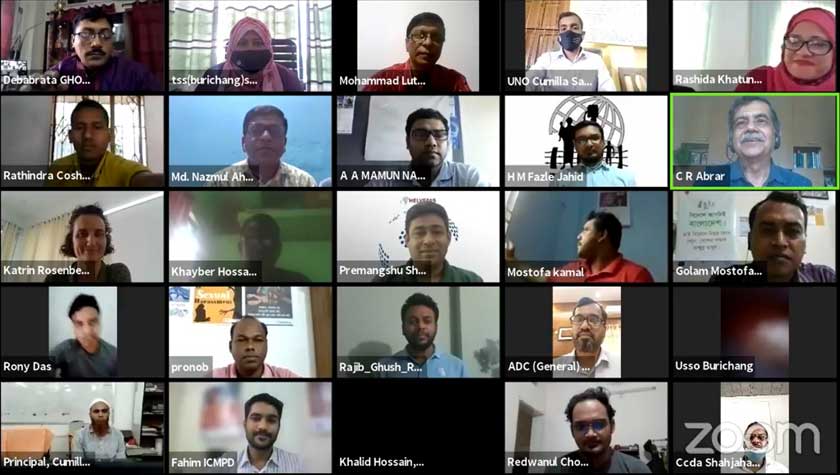
Mohammed Shahadat Hossain, ADC General, Cumilla and the Chief Guest of the event wished the SIMS project every success. He also highlighted some on-going government support and planned initiatives of which SIMS can play an important role.
Date: 13-16 June 2021
Organized by: Refugee and Migratory Movements Research Unit
Supported by: Helvetas Swiss Intercooperation
RMMRU organised a 4-days capacity building training for Social Mobilizers of SIMS project from 13th to 16th April 2021 at Brac Learning Center, Cumilla. The training as organised to develop knowledge on migration issues, project activities and work strategies and disseminate project target and plan. A total number of 15 social mobilizers (5 female and 10 male) from 5 upazilas (25 unions) participated the training. Dr. C R Abrar, Executive Director of RMMRU inaugurated the training online and provided guidance to all participants.The project manager of SIMS PO-Safe Migration discussed about the RMMRU and CCDA. District Coordinator, PO-A2I, PO-Safe Migration and one Upazila Coordinator conducted the different sessions divided in 4 days and PO-A2J, PO-FinLit and Monitoring Officer co-facilitated. The project manager and District Coordinator moderated the total training event.
Through this training the social mobilizers the capacity got enhanced though discussion on the migration, types of migration, risks of migration and mitigating ways, key stakeholders of the migration sector. The rights of migrant workers, types of fraud, legal aid support, ADR in the local level, role of GMC was also discussed under access to justice component. Adding to that, financial literacy, importance and benefits of financial literacy, remittance management and its uses, investment and investment risk and other factors are discussed in detail. MEAL system referral linkage, communication & networking, develop project plans, targets were clarified to the participants.
Ms. Marina Sultana, Programme Director, RMMRU concluded the 4-days training and advised everyone to implement the lessons learned from the training at the field level.
Report on SafeStep Mobile Application Launching Event
Jointly Organised by: RMMRU and Winrock International
Date: June 10, 2021
Venue: Online on Zoom
RMMRU and Winrock International jointly organised a virtual launching event of SafeStep Mobile application on June 10, 2021, from 3:00 pm-4:30 pm (Dhaka time) on Zoom. This event aims to introduce the final version of the SafeStep application, share key features of the application with stakeholders, and identify scope and opportunities for collaboration to promote the application among migrant workers of Bangladesh and inform the migrant community to reduce the migration vulnerabilities present in the migration system.
The programme was moderated by Md. Obaidul Haque, Senior Fellow, RMMRU, and the Associate professor, Department of International Relations, University of Dhaka. Barrister Shamim Haider Patwary, Hon’ble MP, and Chair of the Parliamentarians’ Caucus on Migration and Development, Bangladesh, graced the event as the Chief Guest and Dr. Kamal Uddin Ahmed, Full Time Member, the National Human Rights Commission, Bangladesh, chaired the programme. Ms. Sung In Marshal, Associate Director, ELEVATE Hong Kong Holdings Limited provided the welcome remarks. The event brought together a total of 80 higher officials and representatives from government departments, international development organisations, UN agencies, migrant forums, national NGOs, recruiting agencies, and journalists.
Barrister Shamim Haider Patwary, MP, formally inaugurated the SafeStep application and said, “This is the real milestone in the migration sector. We have to make it popular. It is a modern approach and landmark in the migration justice system. This App should link with a website for serving more information. We have to work together to make it inclusive”.
As a representative of the recruiting agencies, Shamim Ahmed Chowdhury Noman, Former Secretary-General, BAIRA said “Embassies need to be aware of the app and this app must have acceptance in destination countries, only then this programme will be fruitful. Digitalisation in the entire migration sector will reduce many problems that is why the integrated initiative is required to ensure migrants rights”
Technical and Vocational Education and Training (TVET) Specialist Dr. Nurul Islam, said “Easy access, more trails and massive dissemination of the application can be an effective way to reach the doorstep of the migrant community”
Dr. Kamal Uddin Ahmed, Full-time Member, National Human Rights Commission (NHRC) said, “This is a complete App which will be a very influential tool in the pre-departure stage in the migration system. In the post-departure period, the responsibility goes to the embassies, agencies, and the governments. Proper coordination between embassies, employers, agencies, and governments are necessary to reduce the rate of harassment”.
The country representative of Winrock International, Mr. Mesbahul Alam, concluded the event with a vote of thanks.
Venue: NGO Forum Training Center, Tangail
Date: June 8, 2021
At the end of the training, a detail plan to conduct KII and FGD was drawn out and 24 KIIs and 36 FGDs were distributed among 4 teams. The enumerators were provided transcripts of the FGDs and KIIs and time management of the assessment.
Challenges:
1. Ensuring enumerator understands of a huge questionnaire in short time.
2. Planning of time and place of FGD and KII in COVID-19 situation.
3. Time limitations to properly meet and get time for sessions from key informants (they stated that they are too busy).
4. Some of the informants were not interested in showcasing their business documentations (profits, loss, etc.)
5. Some returned migrants were not interested to take loan from Probashi Kallyan Bank.
6. Lack of business skill.
7. Lack of knowledge on digital platforms.
Achievements:
1. Motivated the informants to learn new information on business development.
2. Built capacity of the enumerators on preparing transcripts and communication with local people.
3. Learned systematic approach to gather overall data of income and expenditure as well as to form a usable record of the business.
4. Knowledge delivery of the returned migrants with proper information and ideas of how to take loans from PKB and other banks.
5. Motivated them for digitalizing their business for better profit margins.
Pandemic
Organised by: RMMRU-MFA-PROKAS
Date: 5-6 April 2021
Venue: Online on Zoom
Guest of Honour of the Inaugural Session, Mohamed Yusuf, Governance Adviser, Foreign, Commonwealth & Development Office, British High Commission stated, “Even when the low interest loan is available, the migrants are reluctant to take. It is very critical to identify the reason of low disbursement.” Special Guest Md. Shahidul Haque, Sr. Advisor on Migration and Humanitarian Policy, IOM, Bangladesh expressed “You cannot talk about return without mentioning detention. Protection in terms of detention and human rights has gotten lower, this needs more attention.” Chief Guest of the inaugural session, Imran Ahmad, MP, Hon’ble Minister, Ministry of Expatriates’ Welfare and Overseas Employment, on his speech stated, “Skill development is what we need to be concerned with. The response for training is low even though we’re paying for it, and for certification. We need to talk about systems and changes to overcome this. I look forward to suggestions which are more tangible.” Shirin Lira, Sr. IBP Manager and Gender and Social Inclusion Adviser, PROKAS, British Council added, “Gender sensitiveness should be included in our education curriculum so that people can be empathetic towards male and female migrant workers.”
Dr. Kamal Uddin Ahmed, Full-Time Member, NHRC said, “we need to evaluate the rights of the migrants in respect of their human rights. We have to ensure their rights properly and give them security abroad and after returning.”
William Gois, Regional Coordinator, MFA mentioned, “we have to place reintegration process in the centre of migration governance. It is a matter of rethinking that how we make reintegration mechanism more fundamental and essential Pillar of Temporary Labour Migration.”
After the panelists of Day two shared their views, takeaways and highlights of the conference were presented by Dr. C R Abrar and William Gois for the consideration of the MPs attending the concluding session. The Guests of Honour of the concluding session were the members of Bangladesh Parliamentarians’ Caucus on Migration & Development. The session also featured Dr. Dila Sangroula, MP, House of Representative, Central committee member of Nepali Congress-Nepal and Charles Santiago, MP, Member of Parliament for Klan of Malaysia.
Mahjabeen Khaled, MP, said that, “we are sitting with different stakeholders, beneficiaries. We can follow Philippines in South Asia. Government cannot avoid responsibility to make people aware.” Tanvir Shakil Joy, MP, said, “We don’t have any comprehensive approach to implementation of reintegration in a holistic way. Our migrants need psycho-social counseling. Local government needs to be involved in reintegration process closely.” Rana Mohammad Sohail, MP, stated that, “Returnee migrants are not aware of reintegration. But we have the responsibility as parliamentarians at a policy-making level.” Dr. Dila Sangroula, MP, mentioned, “Returnee migrants are skilled and familiar to the technologies. So, they have scope to create employment using their skill.” Charles Santiago, MP, said, “Reintegration is not just a process on national level, it is a mechanism to cover all the returning migrants’ community of the world.” Special Guest, Barrister Shameem Haider Patwary, MP, Chair, Bangladesh Parliamentarians’ Caucus on Migration & Development stated, “Government can introduce a sub-committee on reintegration of returning migrant workers. Practically returning migrants cannot get loans easily. Civil society can deal with the proper authority to make the issue easier.” Session Chair, Barrister Anisul Islam Mahmud, MP, Chairman, Parliamentary Standing Committee on Ministry of Expatriates’ Welfare and Overseas Employment said, “reintegration” should be economic, social and political. The migrants went abroad to earn money which really helped Bangladesh to grow. Now it is our duty to ensure that, the ones who have returned during COVID 19, are duly reintegrated.”
In his concluding remarks Dr. Abrar thanked each and everyone for joining the two-day international conference and making it a success.
Jointly Organised by BCSM-RMMRU
27 January 2021
Mr. Gerry Fox, finds the book to be a truly impressive piece of work. He said “the book contains really strong information along with research and is important to policy makers.”
Mr. Ignacio Packer, stated, “I found that the book addresses some of the challenges around global migration and the huge amount of challenges that both the states and the migrants themselves are constantly struggling with and how its been exacerbated by the current pandemic.”
Mr. Colin Rajah, said that I am really incredibly impressed and inspired by the level of vibrancy in Bangladesh civil society particularly in relation to migration, we at the global level can learn so much from you in terms of approach and coordination”
Guest of Honour, Mr. Barrister Shameem Haider Patwary, MP, believes, “We need an entrepreneurial state role in skill development, in reshaping the skill in gathering the experience of the returning migrants for upcoming migrants and this way we really have to formulate a national integration policy, it is high time to make a shift from conceptualisation to actualisation.”
Special guest Mr. Md. Motahar Hossain, Additional Secretary, stated, “I have gone through the book I must say I am impressed with the innovative approach that this book takes to provide an in-depth analysis of the concern that have been expressed globally by taking Bangladesh as a case study. I’m sure such an assessment will better the policy framing process for the betterment of the migration governance”.
The Chief Guest, Dr. Hossain Zillur Rahman, said, “The E-book I would commend for being an example of real time knowledge, policy relevant knowledge to affect real time policy making.” According to Mr. Rahman said, the issue here is real time evidence to influence real time policy making and that demands a different type of orientation.
In his concluding remarks Mr. Syed Saiful Haque, Co-chair BCSM believes the “BCSM and RMMRU are actually showing others in local, regional, and also international level, that how Bangladesh civil society can make work together, particularly in the field of advocacy”
Organised by RMMRU-Winrock
10th February 2021
Supported by Winrock International
Major Discussion of the Event
Dr. C R Abrar said “SafeStep Mobile application has opened up new opportunities. It will bring efficiency; it will bring about transparency, which is critical. We engaged the stakeholders who are interested in responsible recruitment, and ethical recruitment as they will understands the importance of this. We are piloting this project to understand to what extent we can bring the benefit of this technology for migrant’s community.”
Ms. Sung In said “we are working together to transform the existing recruiting system and using technology to make migration safer for all workers. We are trying to deliver a useful and impactful solution for workers where they have access to the correct information that helps them make informed decisions etc”
Mr. Shameem Ahmed Chowdhury Noman stated “this is a very useful app and you have included almost everything here, it will help a lot. There are so many things. For the pre migration everything is here. If you include all the registered recruiting agencies in the app, people can choose which agency from here”
Ms. Shahina Ferdousi congratulated RMMRU and Winrock for developing this app, she stated that “l know the Bangladesh government is committed to ensure ethical migration and its transparency, for responsible migration. In the pre-decision stage this app will work. At the same time all migrants workers who want to go or who are interested to go, will be enriched with the information, is certainly commendable “.
Dr. Nurul Islam stated that ‘the mobile application will do is a direct contact between the recruiting agency and the candidates. Secondly, through this mobile application the Visa Checking system can be expanded so the less educated people can check their visa using this mobile application. Thirdly complaint management of this mobile application can be used for migrants.”
Date: 13th March 2021
Organised by RMMRU
Supported by FLM
Objective of the Training
- Building Capacity of GMC on mediation
- Enhance knowledge of GMC members about access to justice for affected migrant communities and improve the skill that will define their role in mediation/Salish.
- Learning mediation process following every stage of mediation with proper guidance, rules and regulations
- Developing understanding on Migration Act -2013
Through this training, the GMC members gathered knowledge though discussion on the dispute and dispute resolution method, the importance of mediation, process of mediation, quality of mediator, Migration Act -2013 in context of Mediation and ADR etc. Participants practiced the mediation through role-play to understand the loopholes of the current mediation system and they shared their experience of mediation to mitigate their challenges.
The opinion of the Participants
Chairman of Silimpur Union, and GMC member Mr. Sadek Ali stated “this type of training is very important to develop the skill of GMC members. Through this training, the members acquired more knowledge to conduct mediation for the migrant’s community”
Mr. Mokbul Husain, GMC member of Elenga said “we are happy to learn more about the mediation process that is very helpful for us. We believe that we can mediate more cases to help the affected migrants in our community
Mr. Rashid thanked RMMRU for organizing such concrete training for the GMC member that will help them to solve problems according to the rules of mediation.
